Leadership and Management for Service Industry
VerifiedAdded on 2023/06/18
|26
|10081
|260
AI Summary
This report discusses the role of leadership and different leadership styles in a service sector industry context. It reviews classical management theories and leadership styles, analyzes management and leadership styles in a specific service sector organization, and assesses current and future management and leadership skills for the service sector. The report also compares and contrasts different service industry organizations, change management systems, and leadership in implementing change.
Contribute Materials
Your contribution can guide someone’s learning journey. Share your
documents today.
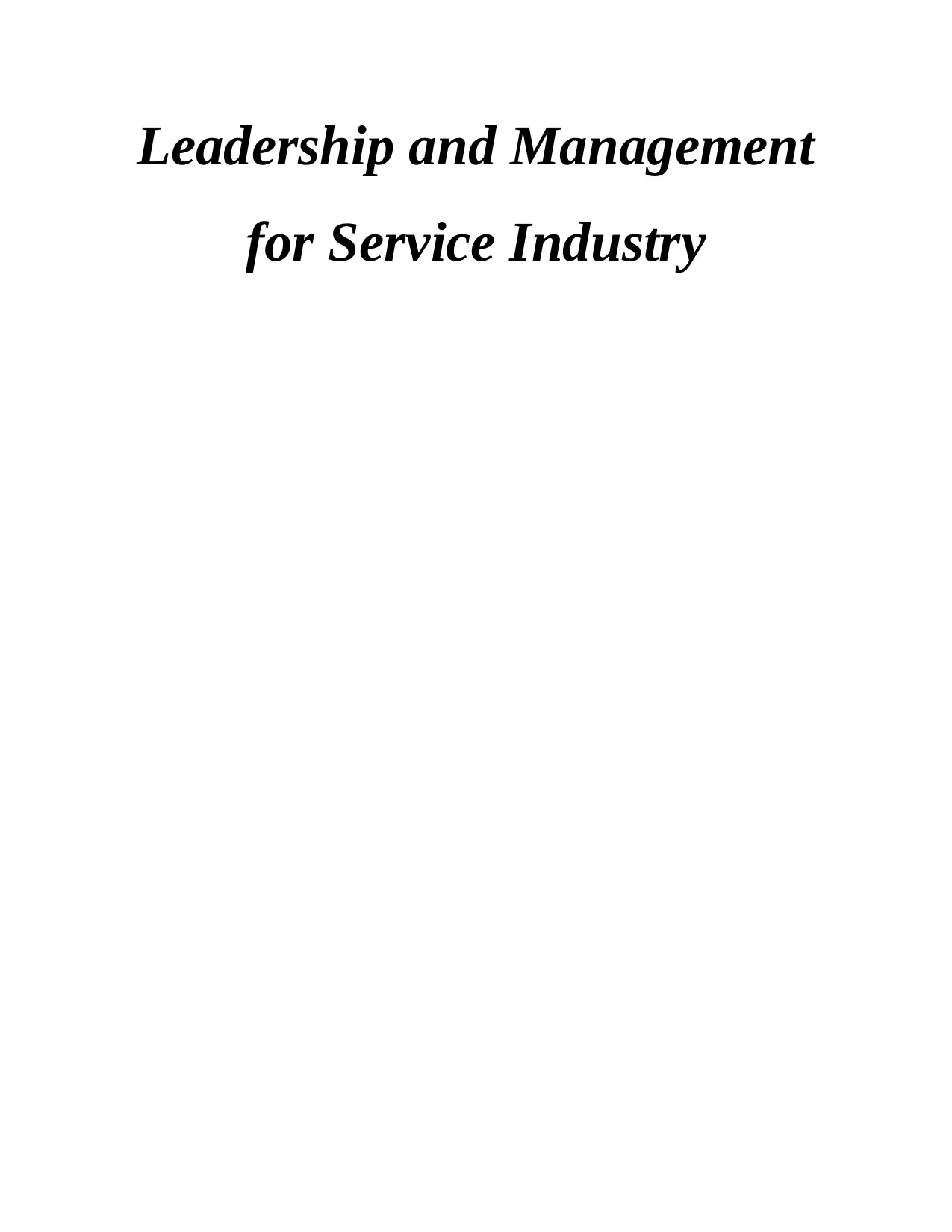
Leadership and Management
for Service Industry
for Service Industry
Secure Best Marks with AI Grader
Need help grading? Try our AI Grader for instant feedback on your assignments.

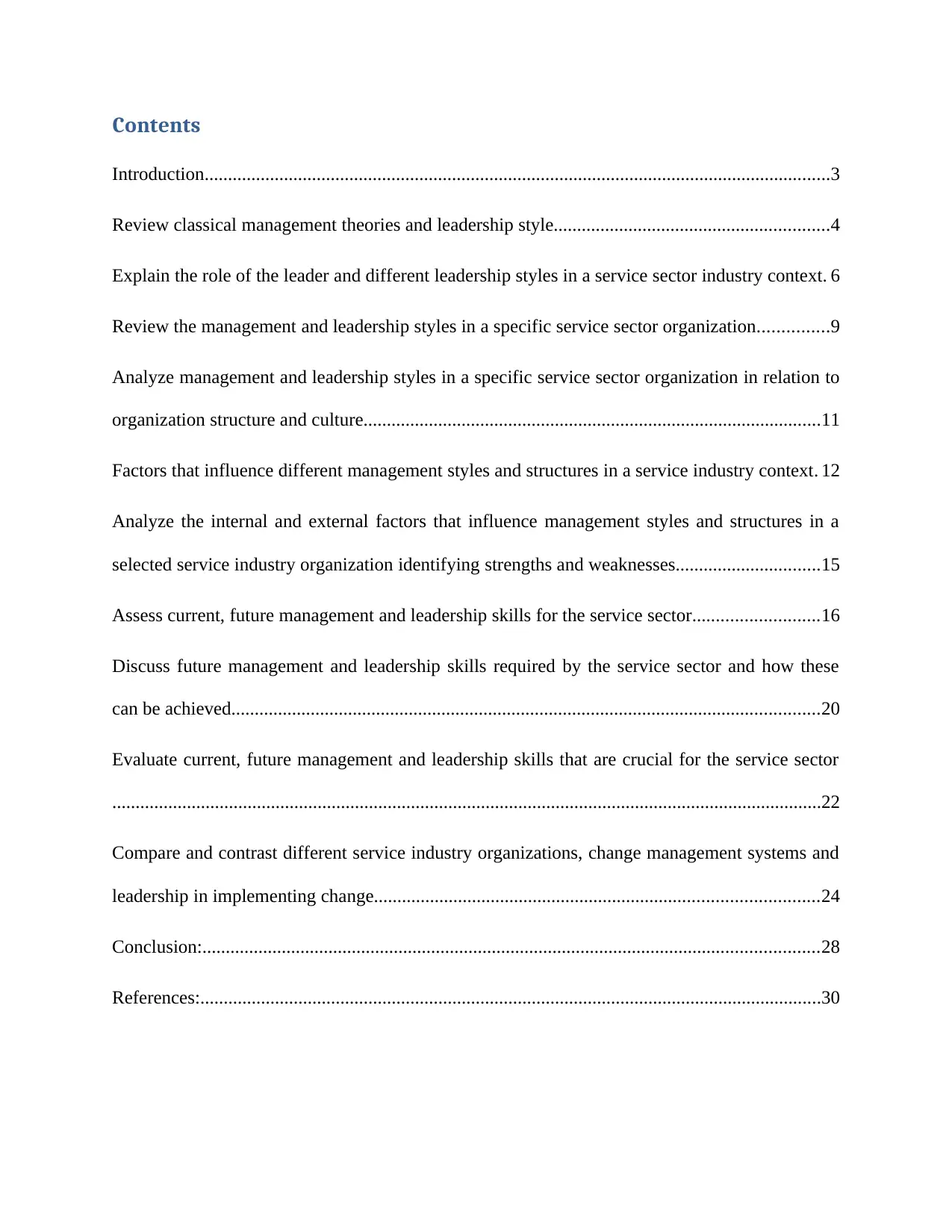
Contents
Introduction......................................................................................................................................3
Review classical management theories and leadership style...........................................................4
Explain the role of the leader and different leadership styles in a service sector industry context. 6
Review the management and leadership styles in a specific service sector organization...............9
Analyze management and leadership styles in a specific service sector organization in relation to
organization structure and culture..................................................................................................11
Factors that influence different management styles and structures in a service industry context. 12
Analyze the internal and external factors that influence management styles and structures in a
selected service industry organization identifying strengths and weaknesses...............................15
Assess current, future management and leadership skills for the service sector...........................16
Discuss future management and leadership skills required by the service sector and how these
can be achieved..............................................................................................................................20
Evaluate current, future management and leadership skills that are crucial for the service sector
........................................................................................................................................................22
Compare and contrast different service industry organizations, change management systems and
leadership in implementing change...............................................................................................24
Conclusion:....................................................................................................................................28
References:.....................................................................................................................................30
Introduction......................................................................................................................................3
Review classical management theories and leadership style...........................................................4
Explain the role of the leader and different leadership styles in a service sector industry context. 6
Review the management and leadership styles in a specific service sector organization...............9
Analyze management and leadership styles in a specific service sector organization in relation to
organization structure and culture..................................................................................................11
Factors that influence different management styles and structures in a service industry context. 12
Analyze the internal and external factors that influence management styles and structures in a
selected service industry organization identifying strengths and weaknesses...............................15
Assess current, future management and leadership skills for the service sector...........................16
Discuss future management and leadership skills required by the service sector and how these
can be achieved..............................................................................................................................20
Evaluate current, future management and leadership skills that are crucial for the service sector
........................................................................................................................................................22
Compare and contrast different service industry organizations, change management systems and
leadership in implementing change...............................................................................................24
Conclusion:....................................................................................................................................28
References:.....................................................................................................................................30
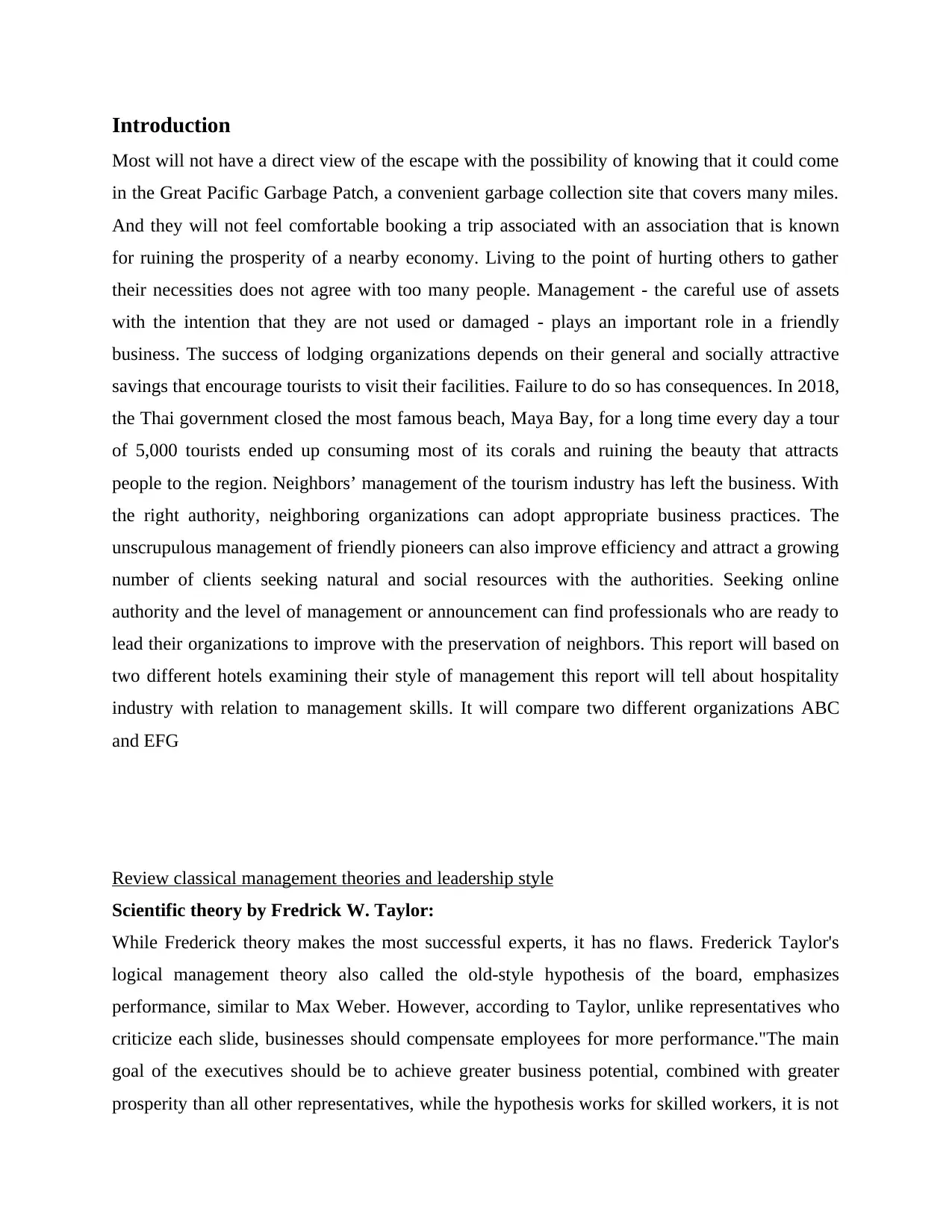
Introduction
Most will not have a direct view of the escape with the possibility of knowing that it could come
in the Great Pacific Garbage Patch, a convenient garbage collection site that covers many miles.
And they will not feel comfortable booking a trip associated with an association that is known
for ruining the prosperity of a nearby economy. Living to the point of hurting others to gather
their necessities does not agree with too many people. Management - the careful use of assets
with the intention that they are not used or damaged - plays an important role in a friendly
business. The success of lodging organizations depends on their general and socially attractive
savings that encourage tourists to visit their facilities. Failure to do so has consequences. In 2018,
the Thai government closed the most famous beach, Maya Bay, for a long time every day a tour
of 5,000 tourists ended up consuming most of its corals and ruining the beauty that attracts
people to the region. Neighbors’ management of the tourism industry has left the business. With
the right authority, neighboring organizations can adopt appropriate business practices. The
unscrupulous management of friendly pioneers can also improve efficiency and attract a growing
number of clients seeking natural and social resources with the authorities. Seeking online
authority and the level of management or announcement can find professionals who are ready to
lead their organizations to improve with the preservation of neighbors. This report will based on
two different hotels examining their style of management this report will tell about hospitality
industry with relation to management skills. It will compare two different organizations ABC
and EFG
Review classical management theories and leadership style
Scientific theory by Fredrick W. Taylor:
While Frederick theory makes the most successful experts, it has no flaws. Frederick Taylor's
logical management theory also called the old-style hypothesis of the board, emphasizes
performance, similar to Max Weber. However, according to Taylor, unlike representatives who
criticize each slide, businesses should compensate employees for more performance."The main
goal of the executives should be to achieve greater business potential, combined with greater
prosperity than all other representatives, while the hypothesis works for skilled workers, it is not
Most will not have a direct view of the escape with the possibility of knowing that it could come
in the Great Pacific Garbage Patch, a convenient garbage collection site that covers many miles.
And they will not feel comfortable booking a trip associated with an association that is known
for ruining the prosperity of a nearby economy. Living to the point of hurting others to gather
their necessities does not agree with too many people. Management - the careful use of assets
with the intention that they are not used or damaged - plays an important role in a friendly
business. The success of lodging organizations depends on their general and socially attractive
savings that encourage tourists to visit their facilities. Failure to do so has consequences. In 2018,
the Thai government closed the most famous beach, Maya Bay, for a long time every day a tour
of 5,000 tourists ended up consuming most of its corals and ruining the beauty that attracts
people to the region. Neighbors’ management of the tourism industry has left the business. With
the right authority, neighboring organizations can adopt appropriate business practices. The
unscrupulous management of friendly pioneers can also improve efficiency and attract a growing
number of clients seeking natural and social resources with the authorities. Seeking online
authority and the level of management or announcement can find professionals who are ready to
lead their organizations to improve with the preservation of neighbors. This report will based on
two different hotels examining their style of management this report will tell about hospitality
industry with relation to management skills. It will compare two different organizations ABC
and EFG
Review classical management theories and leadership style
Scientific theory by Fredrick W. Taylor:
While Frederick theory makes the most successful experts, it has no flaws. Frederick Taylor's
logical management theory also called the old-style hypothesis of the board, emphasizes
performance, similar to Max Weber. However, according to Taylor, unlike representatives who
criticize each slide, businesses should compensate employees for more performance."The main
goal of the executives should be to achieve greater business potential, combined with greater
prosperity than all other representatives, while the hypothesis works for skilled workers, it is not
Paraphrase This Document
Need a fresh take? Get an instant paraphrase of this document with our AI Paraphraser
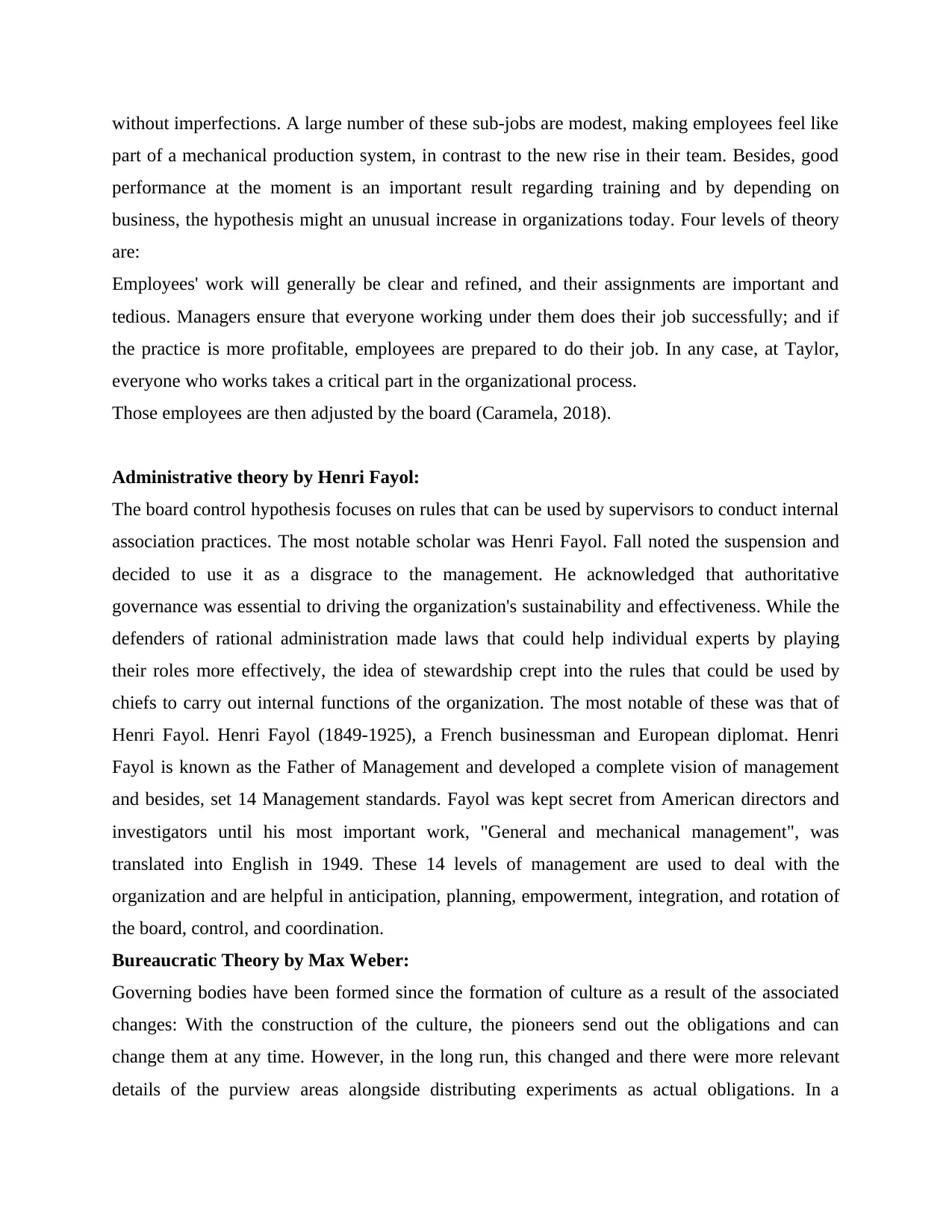
without imperfections. A large number of these sub-jobs are modest, making employees feel like
part of a mechanical production system, in contrast to the new rise in their team. Besides, good
performance at the moment is an important result regarding training and by depending on
business, the hypothesis might an unusual increase in organizations today. Four levels of theory
are:
Employees' work will generally be clear and refined, and their assignments are important and
tedious. Managers ensure that everyone working under them does their job successfully; and if
the practice is more profitable, employees are prepared to do their job. In any case, at Taylor,
everyone who works takes a critical part in the organizational process.
Those employees are then adjusted by the board (Caramela, 2018).
Administrative theory by Henri Fayol:
The board control hypothesis focuses on rules that can be used by supervisors to conduct internal
association practices. The most notable scholar was Henri Fayol. Fall noted the suspension and
decided to use it as a disgrace to the management. He acknowledged that authoritative
governance was essential to driving the organization's sustainability and effectiveness. While the
defenders of rational administration made laws that could help individual experts by playing
their roles more effectively, the idea of stewardship crept into the rules that could be used by
chiefs to carry out internal functions of the organization. The most notable of these was that of
Henri Fayol. Henri Fayol (1849-1925), a French businessman and European diplomat. Henri
Fayol is known as the Father of Management and developed a complete vision of management
and besides, set 14 Management standards. Fayol was kept secret from American directors and
investigators until his most important work, "General and mechanical management", was
translated into English in 1949. These 14 levels of management are used to deal with the
organization and are helpful in anticipation, planning, empowerment, integration, and rotation of
the board, control, and coordination.
Bureaucratic Theory by Max Weber:
Governing bodies have been formed since the formation of culture as a result of the associated
changes: With the construction of the culture, the pioneers send out the obligations and can
change them at any time. However, in the long run, this changed and there were more relevant
details of the purview areas alongside distributing experiments as actual obligations. In a
part of a mechanical production system, in contrast to the new rise in their team. Besides, good
performance at the moment is an important result regarding training and by depending on
business, the hypothesis might an unusual increase in organizations today. Four levels of theory
are:
Employees' work will generally be clear and refined, and their assignments are important and
tedious. Managers ensure that everyone working under them does their job successfully; and if
the practice is more profitable, employees are prepared to do their job. In any case, at Taylor,
everyone who works takes a critical part in the organizational process.
Those employees are then adjusted by the board (Caramela, 2018).
Administrative theory by Henri Fayol:
The board control hypothesis focuses on rules that can be used by supervisors to conduct internal
association practices. The most notable scholar was Henri Fayol. Fall noted the suspension and
decided to use it as a disgrace to the management. He acknowledged that authoritative
governance was essential to driving the organization's sustainability and effectiveness. While the
defenders of rational administration made laws that could help individual experts by playing
their roles more effectively, the idea of stewardship crept into the rules that could be used by
chiefs to carry out internal functions of the organization. The most notable of these was that of
Henri Fayol. Henri Fayol (1849-1925), a French businessman and European diplomat. Henri
Fayol is known as the Father of Management and developed a complete vision of management
and besides, set 14 Management standards. Fayol was kept secret from American directors and
investigators until his most important work, "General and mechanical management", was
translated into English in 1949. These 14 levels of management are used to deal with the
organization and are helpful in anticipation, planning, empowerment, integration, and rotation of
the board, control, and coordination.
Bureaucratic Theory by Max Weber:
Governing bodies have been formed since the formation of culture as a result of the associated
changes: With the construction of the culture, the pioneers send out the obligations and can
change them at any time. However, in the long run, this changed and there were more relevant
details of the purview areas alongside distributing experiments as actual obligations. In a
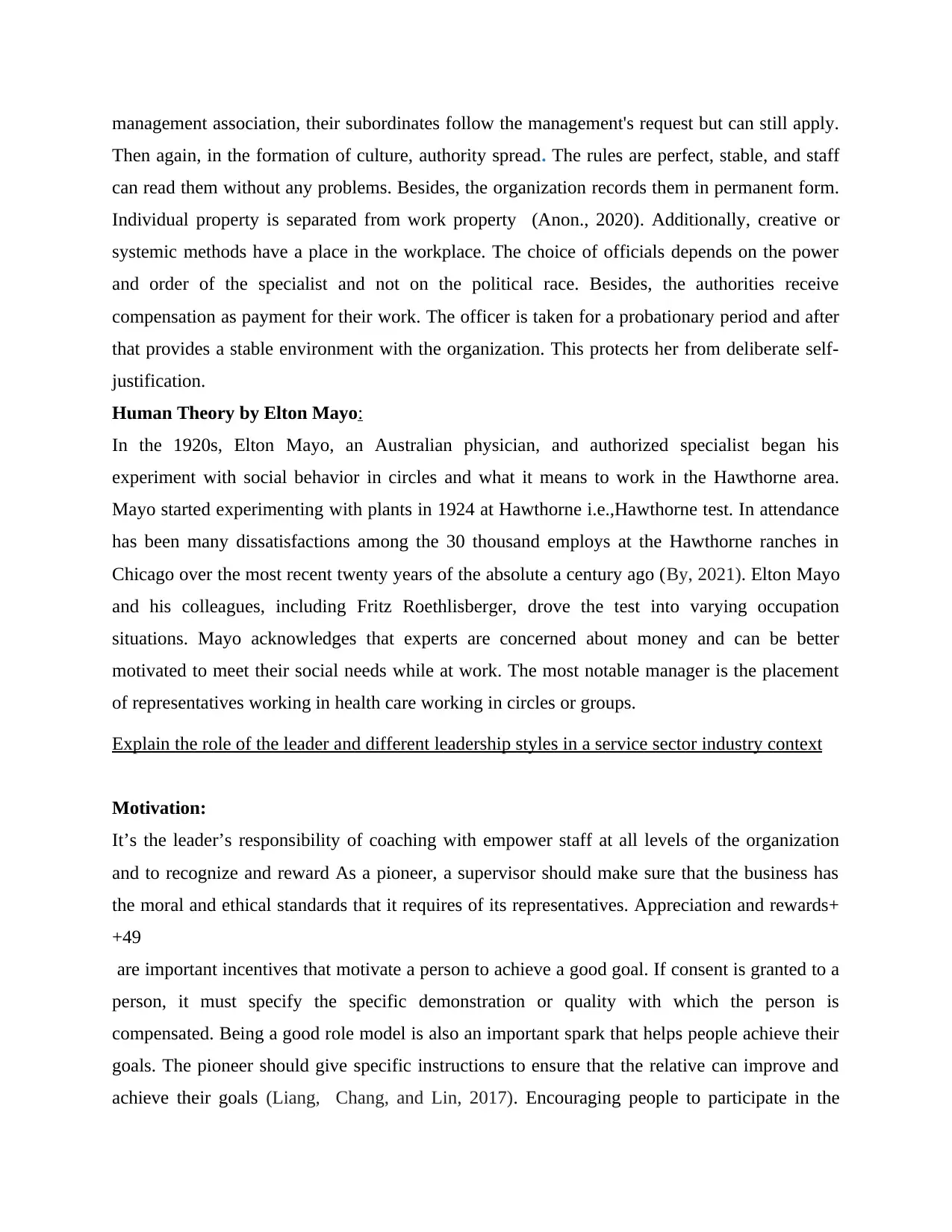
management association, their subordinates follow the management's request but can still apply.
Then again, in the formation of culture, authority spread. The rules are perfect, stable, and staff
can read them without any problems. Besides, the organization records them in permanent form.
Individual property is separated from work property (Anon., 2020). Additionally, creative or
systemic methods have a place in the workplace. The choice of officials depends on the power
and order of the specialist and not on the political race. Besides, the authorities receive
compensation as payment for their work. The officer is taken for a probationary period and after
that provides a stable environment with the organization. This protects her from deliberate self-
justification.
Human Theory by Elton Mayo:
In the 1920s, Elton Mayo, an Australian physician, and authorized specialist began his
experiment with social behavior in circles and what it means to work in the Hawthorne area.
Mayo started experimenting with plants in 1924 at Hawthorne i.e.,Hawthorne test. In attendance
has been many dissatisfactions among the 30 thousand employs at the Hawthorne ranches in
Chicago over the most recent twenty years of the absolute a century ago (By, 2021). Elton Mayo
and his colleagues, including Fritz Roethlisberger, drove the test into varying occupation
situations. Mayo acknowledges that experts are concerned about money and can be better
motivated to meet their social needs while at work. The most notable manager is the placement
of representatives working in health care working in circles or groups.
Explain the role of the leader and different leadership styles in a service sector industry context
Motivation:
It’s the leader’s responsibility of coaching with empower staff at all levels of the organization
and to recognize and reward As a pioneer, a supervisor should make sure that the business has
the moral and ethical standards that it requires of its representatives. Appreciation and rewards+
+49
are important incentives that motivate a person to achieve a good goal. If consent is granted to a
person, it must specify the specific demonstration or quality with which the person is
compensated. Being a good role model is also an important spark that helps people achieve their
goals. The pioneer should give specific instructions to ensure that the relative can improve and
achieve their goals (Liang, Chang, and Lin, 2017). Encouraging people to participate in the
Then again, in the formation of culture, authority spread. The rules are perfect, stable, and staff
can read them without any problems. Besides, the organization records them in permanent form.
Individual property is separated from work property (Anon., 2020). Additionally, creative or
systemic methods have a place in the workplace. The choice of officials depends on the power
and order of the specialist and not on the political race. Besides, the authorities receive
compensation as payment for their work. The officer is taken for a probationary period and after
that provides a stable environment with the organization. This protects her from deliberate self-
justification.
Human Theory by Elton Mayo:
In the 1920s, Elton Mayo, an Australian physician, and authorized specialist began his
experiment with social behavior in circles and what it means to work in the Hawthorne area.
Mayo started experimenting with plants in 1924 at Hawthorne i.e.,Hawthorne test. In attendance
has been many dissatisfactions among the 30 thousand employs at the Hawthorne ranches in
Chicago over the most recent twenty years of the absolute a century ago (By, 2021). Elton Mayo
and his colleagues, including Fritz Roethlisberger, drove the test into varying occupation
situations. Mayo acknowledges that experts are concerned about money and can be better
motivated to meet their social needs while at work. The most notable manager is the placement
of representatives working in health care working in circles or groups.
Explain the role of the leader and different leadership styles in a service sector industry context
Motivation:
It’s the leader’s responsibility of coaching with empower staff at all levels of the organization
and to recognize and reward As a pioneer, a supervisor should make sure that the business has
the moral and ethical standards that it requires of its representatives. Appreciation and rewards+
+49
are important incentives that motivate a person to achieve a good goal. If consent is granted to a
person, it must specify the specific demonstration or quality with which the person is
compensated. Being a good role model is also an important spark that helps people achieve their
goals. The pioneer should give specific instructions to ensure that the relative can improve and
achieve their goals (Liang, Chang, and Lin, 2017). Encouraging people to participate in the
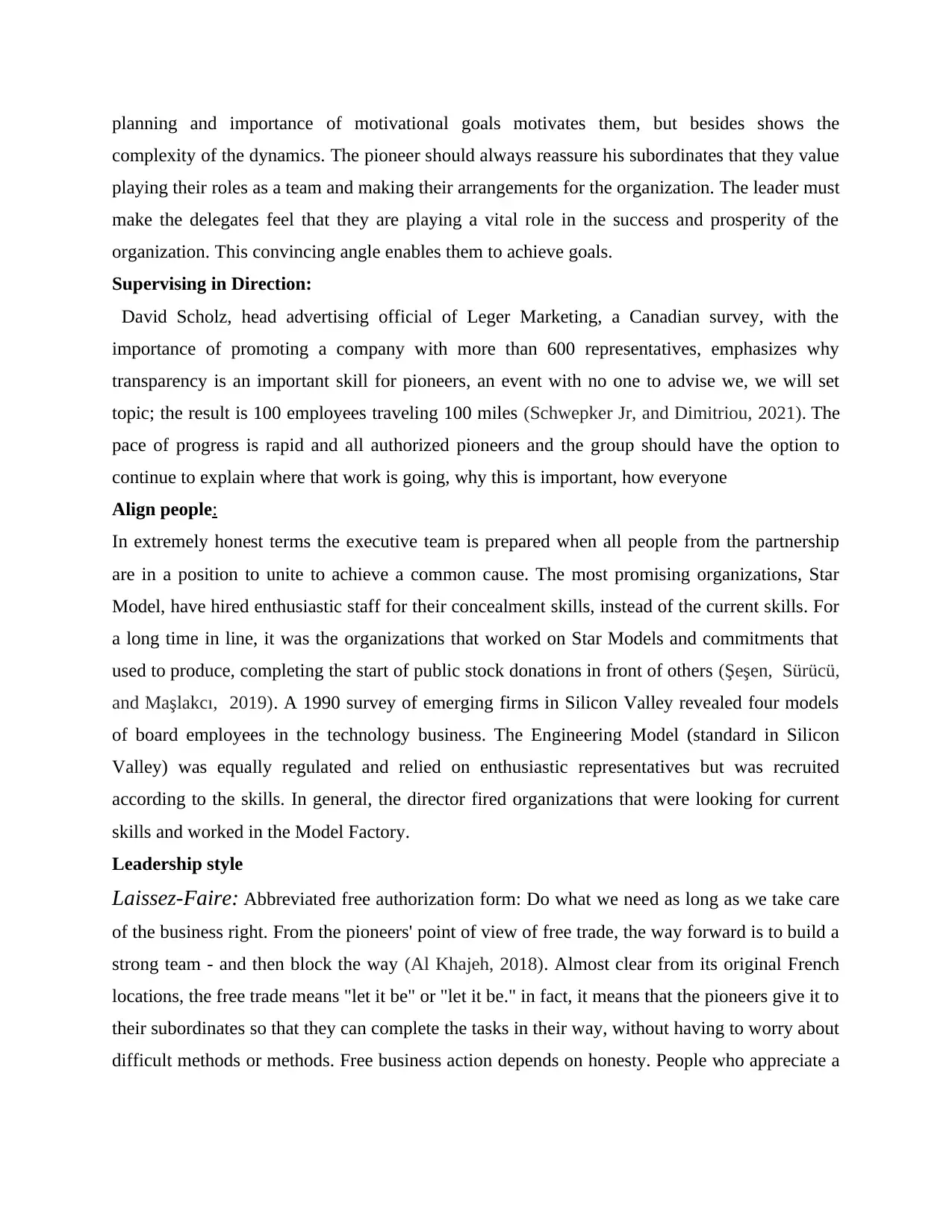
planning and importance of motivational goals motivates them, but besides shows the
complexity of the dynamics. The pioneer should always reassure his subordinates that they value
playing their roles as a team and making their arrangements for the organization. The leader must
make the delegates feel that they are playing a vital role in the success and prosperity of the
organization. This convincing angle enables them to achieve goals.
Supervising in Direction:
David Scholz, head advertising official of Leger Marketing, a Canadian survey, with the
importance of promoting a company with more than 600 representatives, emphasizes why
transparency is an important skill for pioneers, an event with no one to advise we, we will set
topic; the result is 100 employees traveling 100 miles (Schwepker Jr, and Dimitriou, 2021). The
pace of progress is rapid and all authorized pioneers and the group should have the option to
continue to explain where that work is going, why this is important, how everyone
Align people:
In extremely honest terms the executive team is prepared when all people from the partnership
are in a position to unite to achieve a common cause. The most promising organizations, Star
Model, have hired enthusiastic staff for their concealment skills, instead of the current skills. For
a long time in line, it was the organizations that worked on Star Models and commitments that
used to produce, completing the start of public stock donations in front of others (Şeşen, Sürücü,
and Maşlakcı, 2019). A 1990 survey of emerging firms in Silicon Valley revealed four models
of board employees in the technology business. The Engineering Model (standard in Silicon
Valley) was equally regulated and relied on enthusiastic representatives but was recruited
according to the skills. In general, the director fired organizations that were looking for current
skills and worked in the Model Factory.
Leadership style
Laissez-Faire: Abbreviated free authorization form: Do what we need as long as we take care
of the business right. From the pioneers' point of view of free trade, the way forward is to build a
strong team - and then block the way (Al Khajeh, 2018). Almost clear from its original French
locations, the free trade means "let it be" or "let it be." in fact, it means that the pioneers give it to
their subordinates so that they can complete the tasks in their way, without having to worry about
difficult methods or methods. Free business action depends on honesty. People who appreciate a
complexity of the dynamics. The pioneer should always reassure his subordinates that they value
playing their roles as a team and making their arrangements for the organization. The leader must
make the delegates feel that they are playing a vital role in the success and prosperity of the
organization. This convincing angle enables them to achieve goals.
Supervising in Direction:
David Scholz, head advertising official of Leger Marketing, a Canadian survey, with the
importance of promoting a company with more than 600 representatives, emphasizes why
transparency is an important skill for pioneers, an event with no one to advise we, we will set
topic; the result is 100 employees traveling 100 miles (Schwepker Jr, and Dimitriou, 2021). The
pace of progress is rapid and all authorized pioneers and the group should have the option to
continue to explain where that work is going, why this is important, how everyone
Align people:
In extremely honest terms the executive team is prepared when all people from the partnership
are in a position to unite to achieve a common cause. The most promising organizations, Star
Model, have hired enthusiastic staff for their concealment skills, instead of the current skills. For
a long time in line, it was the organizations that worked on Star Models and commitments that
used to produce, completing the start of public stock donations in front of others (Şeşen, Sürücü,
and Maşlakcı, 2019). A 1990 survey of emerging firms in Silicon Valley revealed four models
of board employees in the technology business. The Engineering Model (standard in Silicon
Valley) was equally regulated and relied on enthusiastic representatives but was recruited
according to the skills. In general, the director fired organizations that were looking for current
skills and worked in the Model Factory.
Leadership style
Laissez-Faire: Abbreviated free authorization form: Do what we need as long as we take care
of the business right. From the pioneers' point of view of free trade, the way forward is to build a
strong team - and then block the way (Al Khajeh, 2018). Almost clear from its original French
locations, the free trade means "let it be" or "let it be." in fact, it means that the pioneers give it to
their subordinates so that they can complete the tasks in their way, without having to worry about
difficult methods or methods. Free business action depends on honesty. People who appreciate a
Secure Best Marks with AI Grader
Need help grading? Try our AI Grader for instant feedback on your assignments.
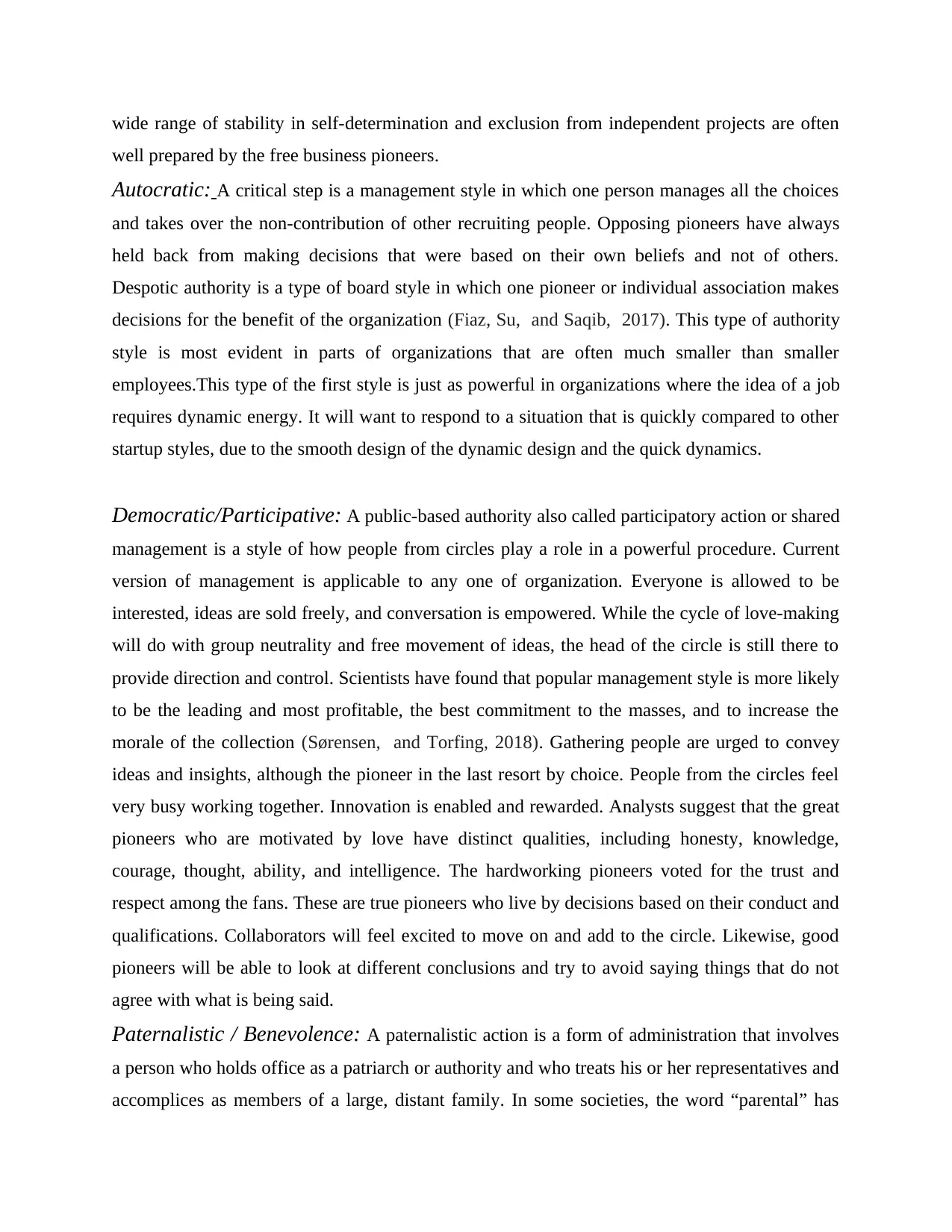
wide range of stability in self-determination and exclusion from independent projects are often
well prepared by the free business pioneers.
Autocratic: A critical step is a management style in which one person manages all the choices
and takes over the non-contribution of other recruiting people. Opposing pioneers have always
held back from making decisions that were based on their own beliefs and not of others.
Despotic authority is a type of board style in which one pioneer or individual association makes
decisions for the benefit of the organization (Fiaz, Su, and Saqib, 2017). This type of authority
style is most evident in parts of organizations that are often much smaller than smaller
employees.This type of the first style is just as powerful in organizations where the idea of a job
requires dynamic energy. It will want to respond to a situation that is quickly compared to other
startup styles, due to the smooth design of the dynamic design and the quick dynamics.
Democratic/Participative: A public-based authority also called participatory action or shared
management is a style of how people from circles play a role in a powerful procedure. Current
version of management is applicable to any one of organization. Everyone is allowed to be
interested, ideas are sold freely, and conversation is empowered. While the cycle of love-making
will do with group neutrality and free movement of ideas, the head of the circle is still there to
provide direction and control. Scientists have found that popular management style is more likely
to be the leading and most profitable, the best commitment to the masses, and to increase the
morale of the collection (Sørensen, and Torfing, 2018). Gathering people are urged to convey
ideas and insights, although the pioneer in the last resort by choice. People from the circles feel
very busy working together. Innovation is enabled and rewarded. Analysts suggest that the great
pioneers who are motivated by love have distinct qualities, including honesty, knowledge,
courage, thought, ability, and intelligence. The hardworking pioneers voted for the trust and
respect among the fans. These are true pioneers who live by decisions based on their conduct and
qualifications. Collaborators will feel excited to move on and add to the circle. Likewise, good
pioneers will be able to look at different conclusions and try to avoid saying things that do not
agree with what is being said.
Paternalistic / Benevolence: A paternalistic action is a form of administration that involves
a person who holds office as a patriarch or authority and who treats his or her representatives and
accomplices as members of a large, distant family. In some societies, the word “parental” has
well prepared by the free business pioneers.
Autocratic: A critical step is a management style in which one person manages all the choices
and takes over the non-contribution of other recruiting people. Opposing pioneers have always
held back from making decisions that were based on their own beliefs and not of others.
Despotic authority is a type of board style in which one pioneer or individual association makes
decisions for the benefit of the organization (Fiaz, Su, and Saqib, 2017). This type of authority
style is most evident in parts of organizations that are often much smaller than smaller
employees.This type of the first style is just as powerful in organizations where the idea of a job
requires dynamic energy. It will want to respond to a situation that is quickly compared to other
startup styles, due to the smooth design of the dynamic design and the quick dynamics.
Democratic/Participative: A public-based authority also called participatory action or shared
management is a style of how people from circles play a role in a powerful procedure. Current
version of management is applicable to any one of organization. Everyone is allowed to be
interested, ideas are sold freely, and conversation is empowered. While the cycle of love-making
will do with group neutrality and free movement of ideas, the head of the circle is still there to
provide direction and control. Scientists have found that popular management style is more likely
to be the leading and most profitable, the best commitment to the masses, and to increase the
morale of the collection (Sørensen, and Torfing, 2018). Gathering people are urged to convey
ideas and insights, although the pioneer in the last resort by choice. People from the circles feel
very busy working together. Innovation is enabled and rewarded. Analysts suggest that the great
pioneers who are motivated by love have distinct qualities, including honesty, knowledge,
courage, thought, ability, and intelligence. The hardworking pioneers voted for the trust and
respect among the fans. These are true pioneers who live by decisions based on their conduct and
qualifications. Collaborators will feel excited to move on and add to the circle. Likewise, good
pioneers will be able to look at different conclusions and try to avoid saying things that do not
agree with what is being said.
Paternalistic / Benevolence: A paternalistic action is a form of administration that involves
a person who holds office as a patriarch or authority and who treats his or her representatives and
accomplices as members of a large, distant family. In some societies, the word “parental” has
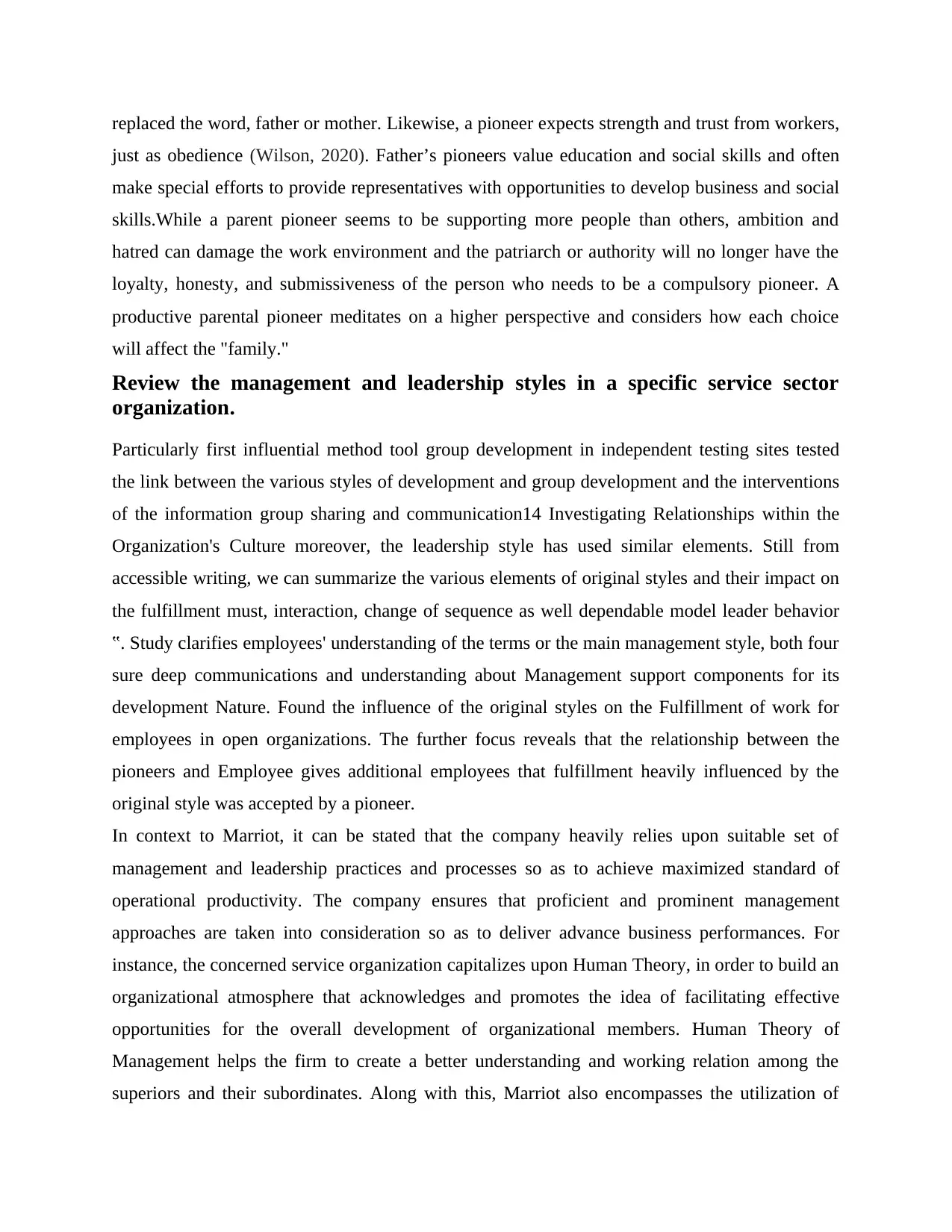
replaced the word, father or mother. Likewise, a pioneer expects strength and trust from workers,
just as obedience (Wilson, 2020). Father’s pioneers value education and social skills and often
make special efforts to provide representatives with opportunities to develop business and social
skills.While a parent pioneer seems to be supporting more people than others, ambition and
hatred can damage the work environment and the patriarch or authority will no longer have the
loyalty, honesty, and submissiveness of the person who needs to be a compulsory pioneer. A
productive parental pioneer meditates on a higher perspective and considers how each choice
will affect the "family."
Review the management and leadership styles in a specific service sector
organization.
Particularly first influential method tool group development in independent testing sites tested
the link between the various styles of development and group development and the interventions
of the information group sharing and communication14 Investigating Relationships within the
Organization's Culture moreover, the leadership style has used similar elements. Still from
accessible writing, we can summarize the various elements of original styles and their impact on
the fulfillment must, interaction, change of sequence as well dependable model leader behavior
‟. Study clarifies employees' understanding of the terms or the main management style, both four
sure deep communications and understanding about Management support components for its
development Nature. Found the influence of the original styles on the Fulfillment of work for
employees in open organizations. The further focus reveals that the relationship between the
pioneers and Employee gives additional employees that fulfillment heavily influenced by the
original style was accepted by a pioneer.
In context to Marriot, it can be stated that the company heavily relies upon suitable set of
management and leadership practices and processes so as to achieve maximized standard of
operational productivity. The company ensures that proficient and prominent management
approaches are taken into consideration so as to deliver advance business performances. For
instance, the concerned service organization capitalizes upon Human Theory, in order to build an
organizational atmosphere that acknowledges and promotes the idea of facilitating effective
opportunities for the overall development of organizational members. Human Theory of
Management helps the firm to create a better understanding and working relation among the
superiors and their subordinates. Along with this, Marriot also encompasses the utilization of
just as obedience (Wilson, 2020). Father’s pioneers value education and social skills and often
make special efforts to provide representatives with opportunities to develop business and social
skills.While a parent pioneer seems to be supporting more people than others, ambition and
hatred can damage the work environment and the patriarch or authority will no longer have the
loyalty, honesty, and submissiveness of the person who needs to be a compulsory pioneer. A
productive parental pioneer meditates on a higher perspective and considers how each choice
will affect the "family."
Review the management and leadership styles in a specific service sector
organization.
Particularly first influential method tool group development in independent testing sites tested
the link between the various styles of development and group development and the interventions
of the information group sharing and communication14 Investigating Relationships within the
Organization's Culture moreover, the leadership style has used similar elements. Still from
accessible writing, we can summarize the various elements of original styles and their impact on
the fulfillment must, interaction, change of sequence as well dependable model leader behavior
‟. Study clarifies employees' understanding of the terms or the main management style, both four
sure deep communications and understanding about Management support components for its
development Nature. Found the influence of the original styles on the Fulfillment of work for
employees in open organizations. The further focus reveals that the relationship between the
pioneers and Employee gives additional employees that fulfillment heavily influenced by the
original style was accepted by a pioneer.
In context to Marriot, it can be stated that the company heavily relies upon suitable set of
management and leadership practices and processes so as to achieve maximized standard of
operational productivity. The company ensures that proficient and prominent management
approaches are taken into consideration so as to deliver advance business performances. For
instance, the concerned service organization capitalizes upon Human Theory, in order to build an
organizational atmosphere that acknowledges and promotes the idea of facilitating effective
opportunities for the overall development of organizational members. Human Theory of
Management helps the firm to create a better understanding and working relation among the
superiors and their subordinates. Along with this, Marriot also encompasses the utilization of
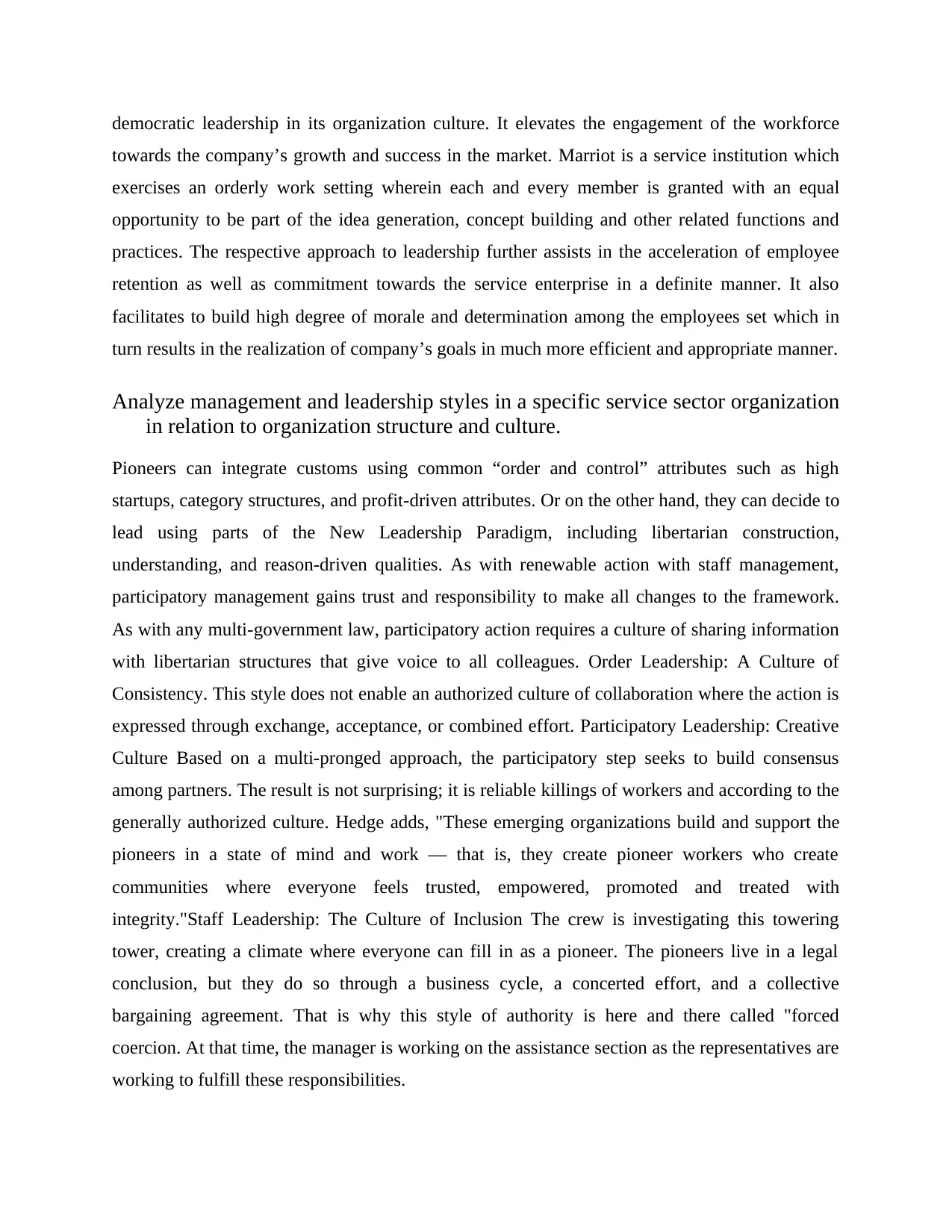
democratic leadership in its organization culture. It elevates the engagement of the workforce
towards the company’s growth and success in the market. Marriot is a service institution which
exercises an orderly work setting wherein each and every member is granted with an equal
opportunity to be part of the idea generation, concept building and other related functions and
practices. The respective approach to leadership further assists in the acceleration of employee
retention as well as commitment towards the service enterprise in a definite manner. It also
facilitates to build high degree of morale and determination among the employees set which in
turn results in the realization of company’s goals in much more efficient and appropriate manner.
Analyze management and leadership styles in a specific service sector organization
in relation to organization structure and culture.
Pioneers can integrate customs using common “order and control” attributes such as high
startups, category structures, and profit-driven attributes. Or on the other hand, they can decide to
lead using parts of the New Leadership Paradigm, including libertarian construction,
understanding, and reason-driven qualities. As with renewable action with staff management,
participatory management gains trust and responsibility to make all changes to the framework.
As with any multi-government law, participatory action requires a culture of sharing information
with libertarian structures that give voice to all colleagues. Order Leadership: A Culture of
Consistency. This style does not enable an authorized culture of collaboration where the action is
expressed through exchange, acceptance, or combined effort. Participatory Leadership: Creative
Culture Based on a multi-pronged approach, the participatory step seeks to build consensus
among partners. The result is not surprising; it is reliable killings of workers and according to the
generally authorized culture. Hedge adds, "These emerging organizations build and support the
pioneers in a state of mind and work — that is, they create pioneer workers who create
communities where everyone feels trusted, empowered, promoted and treated with
integrity."Staff Leadership: The Culture of Inclusion The crew is investigating this towering
tower, creating a climate where everyone can fill in as a pioneer. The pioneers live in a legal
conclusion, but they do so through a business cycle, a concerted effort, and a collective
bargaining agreement. That is why this style of authority is here and there called "forced
coercion. At that time, the manager is working on the assistance section as the representatives are
working to fulfill these responsibilities.
towards the company’s growth and success in the market. Marriot is a service institution which
exercises an orderly work setting wherein each and every member is granted with an equal
opportunity to be part of the idea generation, concept building and other related functions and
practices. The respective approach to leadership further assists in the acceleration of employee
retention as well as commitment towards the service enterprise in a definite manner. It also
facilitates to build high degree of morale and determination among the employees set which in
turn results in the realization of company’s goals in much more efficient and appropriate manner.
Analyze management and leadership styles in a specific service sector organization
in relation to organization structure and culture.
Pioneers can integrate customs using common “order and control” attributes such as high
startups, category structures, and profit-driven attributes. Or on the other hand, they can decide to
lead using parts of the New Leadership Paradigm, including libertarian construction,
understanding, and reason-driven qualities. As with renewable action with staff management,
participatory management gains trust and responsibility to make all changes to the framework.
As with any multi-government law, participatory action requires a culture of sharing information
with libertarian structures that give voice to all colleagues. Order Leadership: A Culture of
Consistency. This style does not enable an authorized culture of collaboration where the action is
expressed through exchange, acceptance, or combined effort. Participatory Leadership: Creative
Culture Based on a multi-pronged approach, the participatory step seeks to build consensus
among partners. The result is not surprising; it is reliable killings of workers and according to the
generally authorized culture. Hedge adds, "These emerging organizations build and support the
pioneers in a state of mind and work — that is, they create pioneer workers who create
communities where everyone feels trusted, empowered, promoted and treated with
integrity."Staff Leadership: The Culture of Inclusion The crew is investigating this towering
tower, creating a climate where everyone can fill in as a pioneer. The pioneers live in a legal
conclusion, but they do so through a business cycle, a concerted effort, and a collective
bargaining agreement. That is why this style of authority is here and there called "forced
coercion. At that time, the manager is working on the assistance section as the representatives are
working to fulfill these responsibilities.
Paraphrase This Document
Need a fresh take? Get an instant paraphrase of this document with our AI Paraphraser
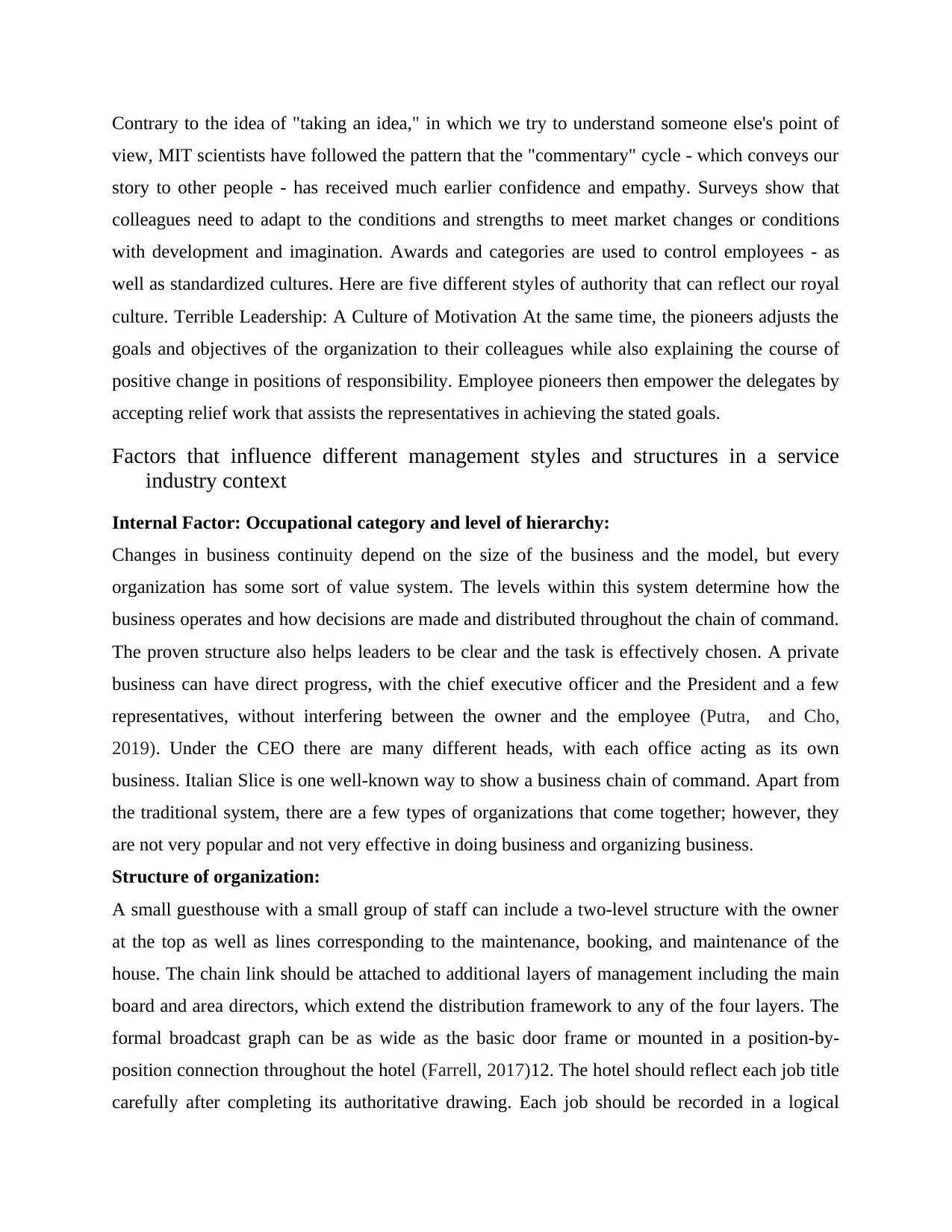
Contrary to the idea of "taking an idea," in which we try to understand someone else's point of
view, MIT scientists have followed the pattern that the "commentary" cycle - which conveys our
story to other people - has received much earlier confidence and empathy. Surveys show that
colleagues need to adapt to the conditions and strengths to meet market changes or conditions
with development and imagination. Awards and categories are used to control employees - as
well as standardized cultures. Here are five different styles of authority that can reflect our royal
culture. Terrible Leadership: A Culture of Motivation At the same time, the pioneers adjusts the
goals and objectives of the organization to their colleagues while also explaining the course of
positive change in positions of responsibility. Employee pioneers then empower the delegates by
accepting relief work that assists the representatives in achieving the stated goals.
Factors that influence different management styles and structures in a service
industry context
Internal Factor: Occupational category and level of hierarchy:
Changes in business continuity depend on the size of the business and the model, but every
organization has some sort of value system. The levels within this system determine how the
business operates and how decisions are made and distributed throughout the chain of command.
The proven structure also helps leaders to be clear and the task is effectively chosen. A private
business can have direct progress, with the chief executive officer and the President and a few
representatives, without interfering between the owner and the employee (Putra, and Cho,
2019). Under the CEO there are many different heads, with each office acting as its own
business. Italian Slice is one well-known way to show a business chain of command. Apart from
the traditional system, there are a few types of organizations that come together; however, they
are not very popular and not very effective in doing business and organizing business.
Structure of organization:
A small guesthouse with a small group of staff can include a two-level structure with the owner
at the top as well as lines corresponding to the maintenance, booking, and maintenance of the
house. The chain link should be attached to additional layers of management including the main
board and area directors, which extend the distribution framework to any of the four layers. The
formal broadcast graph can be as wide as the basic door frame or mounted in a position-by-
position connection throughout the hotel (Farrell, 2017)12. The hotel should reflect each job title
carefully after completing its authoritative drawing. Each job should be recorded in a logical
view, MIT scientists have followed the pattern that the "commentary" cycle - which conveys our
story to other people - has received much earlier confidence and empathy. Surveys show that
colleagues need to adapt to the conditions and strengths to meet market changes or conditions
with development and imagination. Awards and categories are used to control employees - as
well as standardized cultures. Here are five different styles of authority that can reflect our royal
culture. Terrible Leadership: A Culture of Motivation At the same time, the pioneers adjusts the
goals and objectives of the organization to their colleagues while also explaining the course of
positive change in positions of responsibility. Employee pioneers then empower the delegates by
accepting relief work that assists the representatives in achieving the stated goals.
Factors that influence different management styles and structures in a service
industry context
Internal Factor: Occupational category and level of hierarchy:
Changes in business continuity depend on the size of the business and the model, but every
organization has some sort of value system. The levels within this system determine how the
business operates and how decisions are made and distributed throughout the chain of command.
The proven structure also helps leaders to be clear and the task is effectively chosen. A private
business can have direct progress, with the chief executive officer and the President and a few
representatives, without interfering between the owner and the employee (Putra, and Cho,
2019). Under the CEO there are many different heads, with each office acting as its own
business. Italian Slice is one well-known way to show a business chain of command. Apart from
the traditional system, there are a few types of organizations that come together; however, they
are not very popular and not very effective in doing business and organizing business.
Structure of organization:
A small guesthouse with a small group of staff can include a two-level structure with the owner
at the top as well as lines corresponding to the maintenance, booking, and maintenance of the
house. The chain link should be attached to additional layers of management including the main
board and area directors, which extend the distribution framework to any of the four layers. The
formal broadcast graph can be as wide as the basic door frame or mounted in a position-by-
position connection throughout the hotel (Farrell, 2017)12. The hotel should reflect each job title
carefully after completing its authoritative drawing. Each job should be recorded in a logical
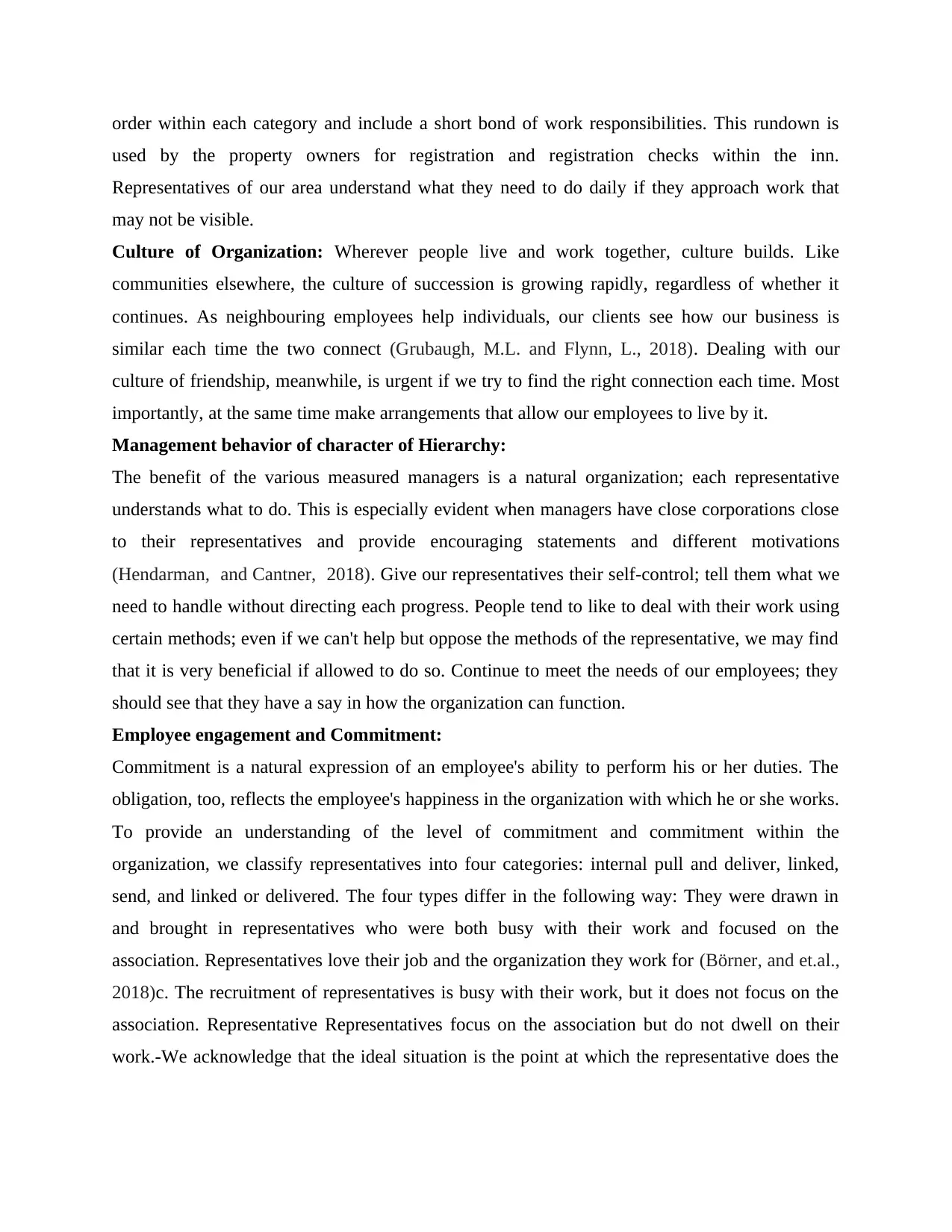
order within each category and include a short bond of work responsibilities. This rundown is
used by the property owners for registration and registration checks within the inn.
Representatives of our area understand what they need to do daily if they approach work that
may not be visible.
Culture of Organization: Wherever people live and work together, culture builds. Like
communities elsewhere, the culture of succession is growing rapidly, regardless of whether it
continues. As neighbouring employees help individuals, our clients see how our business is
similar each time the two connect (Grubaugh, M.L. and Flynn, L., 2018). Dealing with our
culture of friendship, meanwhile, is urgent if we try to find the right connection each time. Most
importantly, at the same time make arrangements that allow our employees to live by it.
Management behavior of character of Hierarchy:
The benefit of the various measured managers is a natural organization; each representative
understands what to do. This is especially evident when managers have close corporations close
to their representatives and provide encouraging statements and different motivations
(Hendarman, and Cantner, 2018). Give our representatives their self-control; tell them what we
need to handle without directing each progress. People tend to like to deal with their work using
certain methods; even if we can't help but oppose the methods of the representative, we may find
that it is very beneficial if allowed to do so. Continue to meet the needs of our employees; they
should see that they have a say in how the organization can function.
Employee engagement and Commitment:
Commitment is a natural expression of an employee's ability to perform his or her duties. The
obligation, too, reflects the employee's happiness in the organization with which he or she works.
To provide an understanding of the level of commitment and commitment within the
organization, we classify representatives into four categories: internal pull and deliver, linked,
send, and linked or delivered. The four types differ in the following way: They were drawn in
and brought in representatives who were both busy with their work and focused on the
association. Representatives love their job and the organization they work for (Börner, and et.al.,
2018)c. The recruitment of representatives is busy with their work, but it does not focus on the
association. Representative Representatives focus on the association but do not dwell on their
work.-We acknowledge that the ideal situation is the point at which the representative does the
used by the property owners for registration and registration checks within the inn.
Representatives of our area understand what they need to do daily if they approach work that
may not be visible.
Culture of Organization: Wherever people live and work together, culture builds. Like
communities elsewhere, the culture of succession is growing rapidly, regardless of whether it
continues. As neighbouring employees help individuals, our clients see how our business is
similar each time the two connect (Grubaugh, M.L. and Flynn, L., 2018). Dealing with our
culture of friendship, meanwhile, is urgent if we try to find the right connection each time. Most
importantly, at the same time make arrangements that allow our employees to live by it.
Management behavior of character of Hierarchy:
The benefit of the various measured managers is a natural organization; each representative
understands what to do. This is especially evident when managers have close corporations close
to their representatives and provide encouraging statements and different motivations
(Hendarman, and Cantner, 2018). Give our representatives their self-control; tell them what we
need to handle without directing each progress. People tend to like to deal with their work using
certain methods; even if we can't help but oppose the methods of the representative, we may find
that it is very beneficial if allowed to do so. Continue to meet the needs of our employees; they
should see that they have a say in how the organization can function.
Employee engagement and Commitment:
Commitment is a natural expression of an employee's ability to perform his or her duties. The
obligation, too, reflects the employee's happiness in the organization with which he or she works.
To provide an understanding of the level of commitment and commitment within the
organization, we classify representatives into four categories: internal pull and deliver, linked,
send, and linked or delivered. The four types differ in the following way: They were drawn in
and brought in representatives who were both busy with their work and focused on the
association. Representatives love their job and the organization they work for (Börner, and et.al.,
2018)c. The recruitment of representatives is busy with their work, but it does not focus on the
association. Representative Representatives focus on the association but do not dwell on their
work.-We acknowledge that the ideal situation is the point at which the representative does the
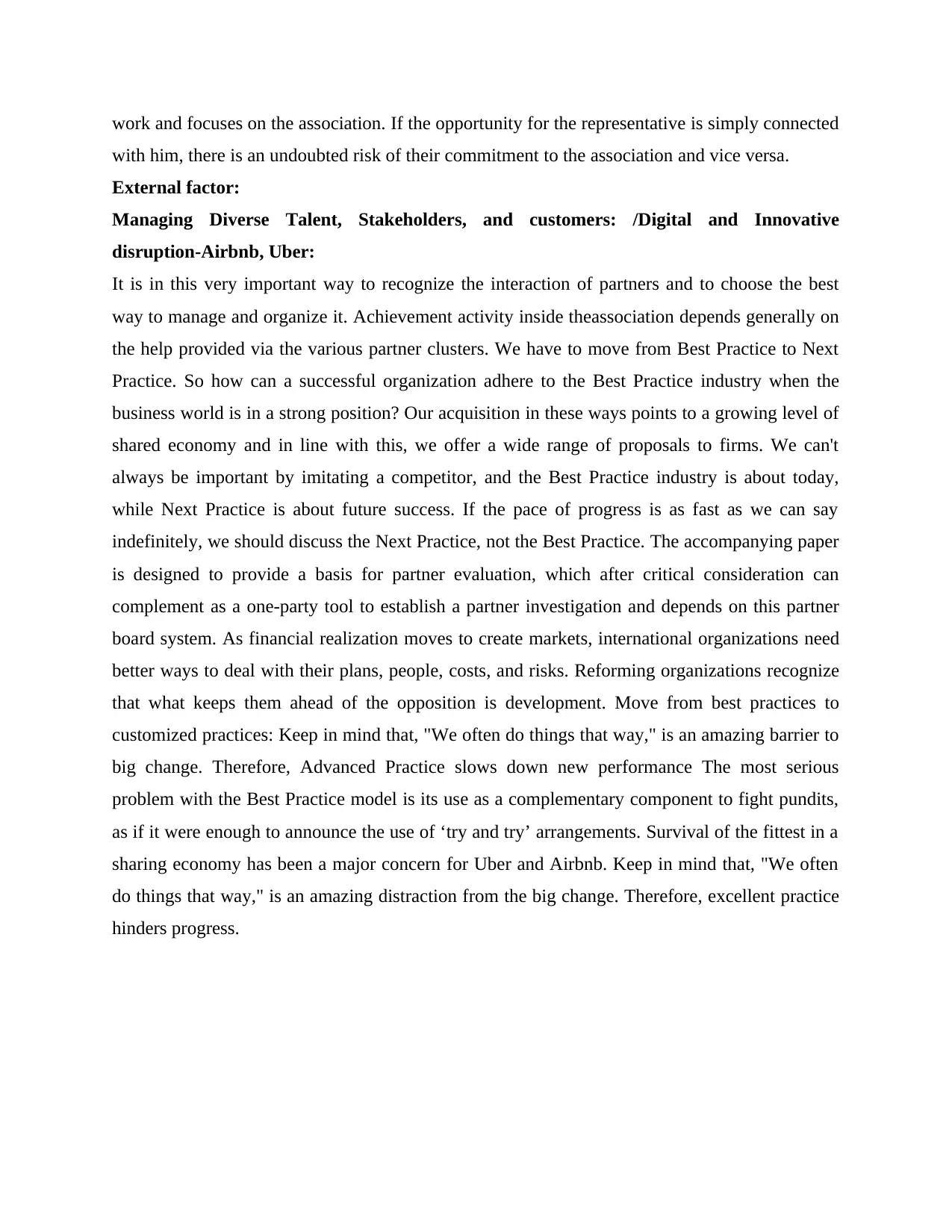
work and focuses on the association. If the opportunity for the representative is simply connected
with him, there is an undoubted risk of their commitment to the association and vice versa.
External factor:
Managing Diverse Talent, Stakeholders, and customers: /Digital and Innovative
disruption-Airbnb, Uber:
It is in this very important way to recognize the interaction of partners and to choose the best
way to manage and organize it. Achievement activity inside theassociation depends generally on
the help provided via the various partner clusters. We have to move from Best Practice to Next
Practice. So how can a successful organization adhere to the Best Practice industry when the
business world is in a strong position? Our acquisition in these ways points to a growing level of
shared economy and in line with this, we offer a wide range of proposals to firms. We can't
always be important by imitating a competitor, and the Best Practice industry is about today,
while Next Practice is about future success. If the pace of progress is as fast as we can say
indefinitely, we should discuss the Next Practice, not the Best Practice. The accompanying paper
is designed to provide a basis for partner evaluation, which after critical consideration can
complement as a one-party tool to establish a partner investigation and depends on this partner
board system. As financial realization moves to create markets, international organizations need
better ways to deal with their plans, people, costs, and risks. Reforming organizations recognize
that what keeps them ahead of the opposition is development. Move from best practices to
customized practices: Keep in mind that, "We often do things that way," is an amazing barrier to
big change. Therefore, Advanced Practice slows down new performance The most serious
problem with the Best Practice model is its use as a complementary component to fight pundits,
as if it were enough to announce the use of ‘try and try’ arrangements. Survival of the fittest in a
sharing economy has been a major concern for Uber and Airbnb. Keep in mind that, "We often
do things that way," is an amazing distraction from the big change. Therefore, excellent practice
hinders progress.
with him, there is an undoubted risk of their commitment to the association and vice versa.
External factor:
Managing Diverse Talent, Stakeholders, and customers: /Digital and Innovative
disruption-Airbnb, Uber:
It is in this very important way to recognize the interaction of partners and to choose the best
way to manage and organize it. Achievement activity inside theassociation depends generally on
the help provided via the various partner clusters. We have to move from Best Practice to Next
Practice. So how can a successful organization adhere to the Best Practice industry when the
business world is in a strong position? Our acquisition in these ways points to a growing level of
shared economy and in line with this, we offer a wide range of proposals to firms. We can't
always be important by imitating a competitor, and the Best Practice industry is about today,
while Next Practice is about future success. If the pace of progress is as fast as we can say
indefinitely, we should discuss the Next Practice, not the Best Practice. The accompanying paper
is designed to provide a basis for partner evaluation, which after critical consideration can
complement as a one-party tool to establish a partner investigation and depends on this partner
board system. As financial realization moves to create markets, international organizations need
better ways to deal with their plans, people, costs, and risks. Reforming organizations recognize
that what keeps them ahead of the opposition is development. Move from best practices to
customized practices: Keep in mind that, "We often do things that way," is an amazing barrier to
big change. Therefore, Advanced Practice slows down new performance The most serious
problem with the Best Practice model is its use as a complementary component to fight pundits,
as if it were enough to announce the use of ‘try and try’ arrangements. Survival of the fittest in a
sharing economy has been a major concern for Uber and Airbnb. Keep in mind that, "We often
do things that way," is an amazing distraction from the big change. Therefore, excellent practice
hinders progress.
Secure Best Marks with AI Grader
Need help grading? Try our AI Grader for instant feedback on your assignments.
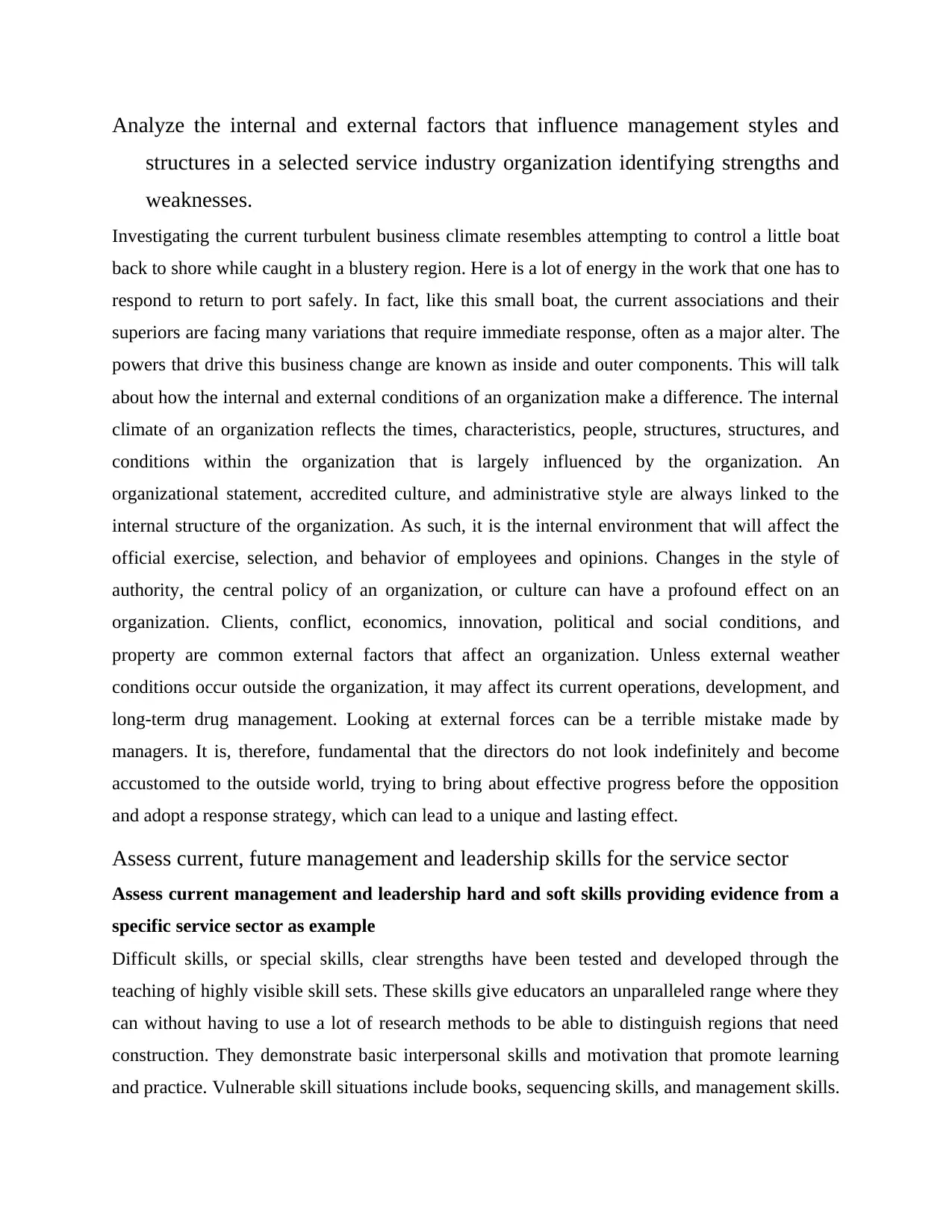
Analyze the internal and external factors that influence management styles and
structures in a selected service industry organization identifying strengths and
weaknesses.
Investigating the current turbulent business climate resembles attempting to control a little boat
back to shore while caught in a blustery region. Here is a lot of energy in the work that one has to
respond to return to port safely. In fact, like this small boat, the current associations and their
superiors are facing many variations that require immediate response, often as a major alter. The
powers that drive this business change are known as inside and outer components. This will talk
about how the internal and external conditions of an organization make a difference. The internal
climate of an organization reflects the times, characteristics, people, structures, structures, and
conditions within the organization that is largely influenced by the organization. An
organizational statement, accredited culture, and administrative style are always linked to the
internal structure of the organization. As such, it is the internal environment that will affect the
official exercise, selection, and behavior of employees and opinions. Changes in the style of
authority, the central policy of an organization, or culture can have a profound effect on an
organization. Clients, conflict, economics, innovation, political and social conditions, and
property are common external factors that affect an organization. Unless external weather
conditions occur outside the organization, it may affect its current operations, development, and
long-term drug management. Looking at external forces can be a terrible mistake made by
managers. It is, therefore, fundamental that the directors do not look indefinitely and become
accustomed to the outside world, trying to bring about effective progress before the opposition
and adopt a response strategy, which can lead to a unique and lasting effect.
Assess current, future management and leadership skills for the service sector
Assess current management and leadership hard and soft skills providing evidence from a
specific service sector as example
Difficult skills, or special skills, clear strengths have been tested and developed through the
teaching of highly visible skill sets. These skills give educators an unparalleled range where they
can without having to use a lot of research methods to be able to distinguish regions that need
construction. They demonstrate basic interpersonal skills and motivation that promote learning
and practice. Vulnerable skill situations include books, sequencing skills, and management skills.
structures in a selected service industry organization identifying strengths and
weaknesses.
Investigating the current turbulent business climate resembles attempting to control a little boat
back to shore while caught in a blustery region. Here is a lot of energy in the work that one has to
respond to return to port safely. In fact, like this small boat, the current associations and their
superiors are facing many variations that require immediate response, often as a major alter. The
powers that drive this business change are known as inside and outer components. This will talk
about how the internal and external conditions of an organization make a difference. The internal
climate of an organization reflects the times, characteristics, people, structures, structures, and
conditions within the organization that is largely influenced by the organization. An
organizational statement, accredited culture, and administrative style are always linked to the
internal structure of the organization. As such, it is the internal environment that will affect the
official exercise, selection, and behavior of employees and opinions. Changes in the style of
authority, the central policy of an organization, or culture can have a profound effect on an
organization. Clients, conflict, economics, innovation, political and social conditions, and
property are common external factors that affect an organization. Unless external weather
conditions occur outside the organization, it may affect its current operations, development, and
long-term drug management. Looking at external forces can be a terrible mistake made by
managers. It is, therefore, fundamental that the directors do not look indefinitely and become
accustomed to the outside world, trying to bring about effective progress before the opposition
and adopt a response strategy, which can lead to a unique and lasting effect.
Assess current, future management and leadership skills for the service sector
Assess current management and leadership hard and soft skills providing evidence from a
specific service sector as example
Difficult skills, or special skills, clear strengths have been tested and developed through the
teaching of highly visible skill sets. These skills give educators an unparalleled range where they
can without having to use a lot of research methods to be able to distinguish regions that need
construction. They demonstrate basic interpersonal skills and motivation that promote learning
and practice. Vulnerable skill situations include books, sequencing skills, and management skills.
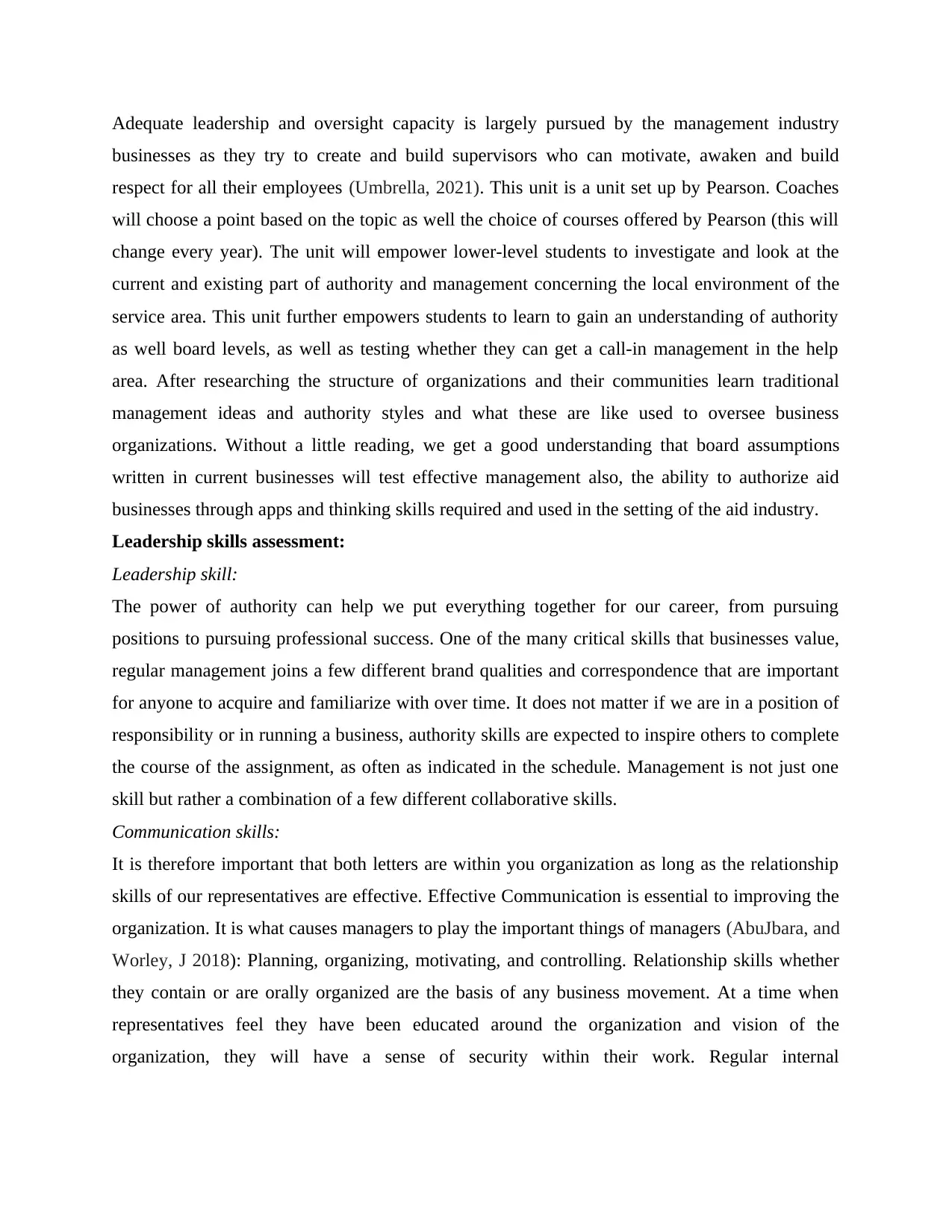
Adequate leadership and oversight capacity is largely pursued by the management industry
businesses as they try to create and build supervisors who can motivate, awaken and build
respect for all their employees (Umbrella, 2021). This unit is a unit set up by Pearson. Coaches
will choose a point based on the topic as well the choice of courses offered by Pearson (this will
change every year). The unit will empower lower-level students to investigate and look at the
current and existing part of authority and management concerning the local environment of the
service area. This unit further empowers students to learn to gain an understanding of authority
as well board levels, as well as testing whether they can get a call-in management in the help
area. After researching the structure of organizations and their communities learn traditional
management ideas and authority styles and what these are like used to oversee business
organizations. Without a little reading, we get a good understanding that board assumptions
written in current businesses will test effective management also, the ability to authorize aid
businesses through apps and thinking skills required and used in the setting of the aid industry.
Leadership skills assessment:
Leadership skill:
The power of authority can help we put everything together for our career, from pursuing
positions to pursuing professional success. One of the many critical skills that businesses value,
regular management joins a few different brand qualities and correspondence that are important
for anyone to acquire and familiarize with over time. It does not matter if we are in a position of
responsibility or in running a business, authority skills are expected to inspire others to complete
the course of the assignment, as often as indicated in the schedule. Management is not just one
skill but rather a combination of a few different collaborative skills.
Communication skills:
It is therefore important that both letters are within you organization as long as the relationship
skills of our representatives are effective. Effective Communication is essential to improving the
organization. It is what causes managers to play the important things of managers (AbuJbara, and
Worley, J 2018): Planning, organizing, motivating, and controlling. Relationship skills whether
they contain or are orally organized are the basis of any business movement. At a time when
representatives feel they have been educated around the organization and vision of the
organization, they will have a sense of security within their work. Regular internal
businesses as they try to create and build supervisors who can motivate, awaken and build
respect for all their employees (Umbrella, 2021). This unit is a unit set up by Pearson. Coaches
will choose a point based on the topic as well the choice of courses offered by Pearson (this will
change every year). The unit will empower lower-level students to investigate and look at the
current and existing part of authority and management concerning the local environment of the
service area. This unit further empowers students to learn to gain an understanding of authority
as well board levels, as well as testing whether they can get a call-in management in the help
area. After researching the structure of organizations and their communities learn traditional
management ideas and authority styles and what these are like used to oversee business
organizations. Without a little reading, we get a good understanding that board assumptions
written in current businesses will test effective management also, the ability to authorize aid
businesses through apps and thinking skills required and used in the setting of the aid industry.
Leadership skills assessment:
Leadership skill:
The power of authority can help we put everything together for our career, from pursuing
positions to pursuing professional success. One of the many critical skills that businesses value,
regular management joins a few different brand qualities and correspondence that are important
for anyone to acquire and familiarize with over time. It does not matter if we are in a position of
responsibility or in running a business, authority skills are expected to inspire others to complete
the course of the assignment, as often as indicated in the schedule. Management is not just one
skill but rather a combination of a few different collaborative skills.
Communication skills:
It is therefore important that both letters are within you organization as long as the relationship
skills of our representatives are effective. Effective Communication is essential to improving the
organization. It is what causes managers to play the important things of managers (AbuJbara, and
Worley, J 2018): Planning, organizing, motivating, and controlling. Relationship skills whether
they contain or are orally organized are the basis of any business movement. At a time when
representatives feel they have been educated around the organization and vision of the
organization, they will have a sense of security within their work. Regular internal
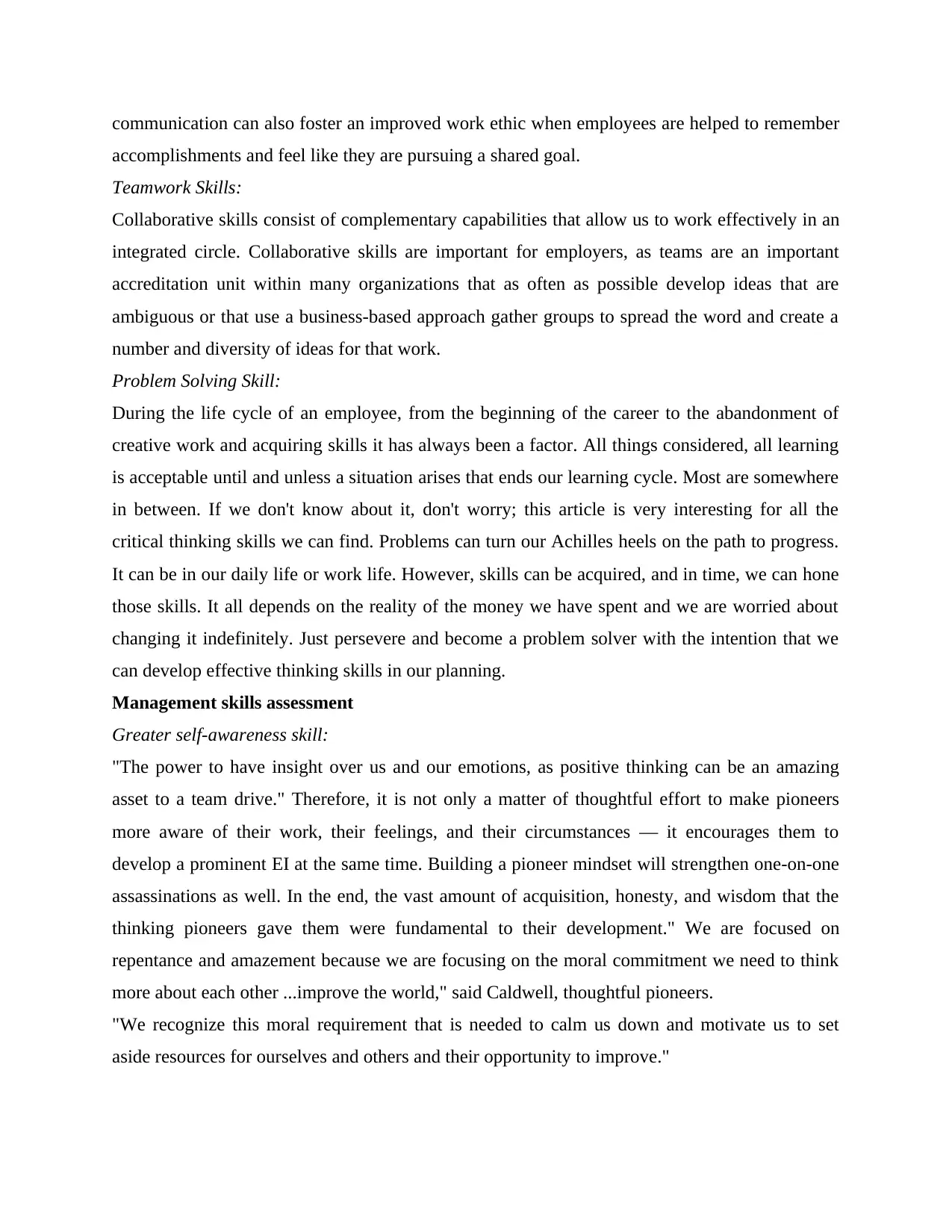
communication can also foster an improved work ethic when employees are helped to remember
accomplishments and feel like they are pursuing a shared goal.
Teamwork Skills:
Collaborative skills consist of complementary capabilities that allow us to work effectively in an
integrated circle. Collaborative skills are important for employers, as teams are an important
accreditation unit within many organizations that as often as possible develop ideas that are
ambiguous or that use a business-based approach gather groups to spread the word and create a
number and diversity of ideas for that work.
Problem Solving Skill:
During the life cycle of an employee, from the beginning of the career to the abandonment of
creative work and acquiring skills it has always been a factor. All things considered, all learning
is acceptable until and unless a situation arises that ends our learning cycle. Most are somewhere
in between. If we don't know about it, don't worry; this article is very interesting for all the
critical thinking skills we can find. Problems can turn our Achilles heels on the path to progress.
It can be in our daily life or work life. However, skills can be acquired, and in time, we can hone
those skills. It all depends on the reality of the money we have spent and we are worried about
changing it indefinitely. Just persevere and become a problem solver with the intention that we
can develop effective thinking skills in our planning.
Management skills assessment
Greater self-awareness skill:
"The power to have insight over us and our emotions, as positive thinking can be an amazing
asset to a team drive." Therefore, it is not only a matter of thoughtful effort to make pioneers
more aware of their work, their feelings, and their circumstances — it encourages them to
develop a prominent EI at the same time. Building a pioneer mindset will strengthen one-on-one
assassinations as well. In the end, the vast amount of acquisition, honesty, and wisdom that the
thinking pioneers gave them were fundamental to their development." We are focused on
repentance and amazement because we are focusing on the moral commitment we need to think
more about each other ...improve the world," said Caldwell, thoughtful pioneers.
"We recognize this moral requirement that is needed to calm us down and motivate us to set
aside resources for ourselves and others and their opportunity to improve."
accomplishments and feel like they are pursuing a shared goal.
Teamwork Skills:
Collaborative skills consist of complementary capabilities that allow us to work effectively in an
integrated circle. Collaborative skills are important for employers, as teams are an important
accreditation unit within many organizations that as often as possible develop ideas that are
ambiguous or that use a business-based approach gather groups to spread the word and create a
number and diversity of ideas for that work.
Problem Solving Skill:
During the life cycle of an employee, from the beginning of the career to the abandonment of
creative work and acquiring skills it has always been a factor. All things considered, all learning
is acceptable until and unless a situation arises that ends our learning cycle. Most are somewhere
in between. If we don't know about it, don't worry; this article is very interesting for all the
critical thinking skills we can find. Problems can turn our Achilles heels on the path to progress.
It can be in our daily life or work life. However, skills can be acquired, and in time, we can hone
those skills. It all depends on the reality of the money we have spent and we are worried about
changing it indefinitely. Just persevere and become a problem solver with the intention that we
can develop effective thinking skills in our planning.
Management skills assessment
Greater self-awareness skill:
"The power to have insight over us and our emotions, as positive thinking can be an amazing
asset to a team drive." Therefore, it is not only a matter of thoughtful effort to make pioneers
more aware of their work, their feelings, and their circumstances — it encourages them to
develop a prominent EI at the same time. Building a pioneer mindset will strengthen one-on-one
assassinations as well. In the end, the vast amount of acquisition, honesty, and wisdom that the
thinking pioneers gave them were fundamental to their development." We are focused on
repentance and amazement because we are focusing on the moral commitment we need to think
more about each other ...improve the world," said Caldwell, thoughtful pioneers.
"We recognize this moral requirement that is needed to calm us down and motivate us to set
aside resources for ourselves and others and their opportunity to improve."
Paraphrase This Document
Need a fresh take? Get an instant paraphrase of this document with our AI Paraphraser
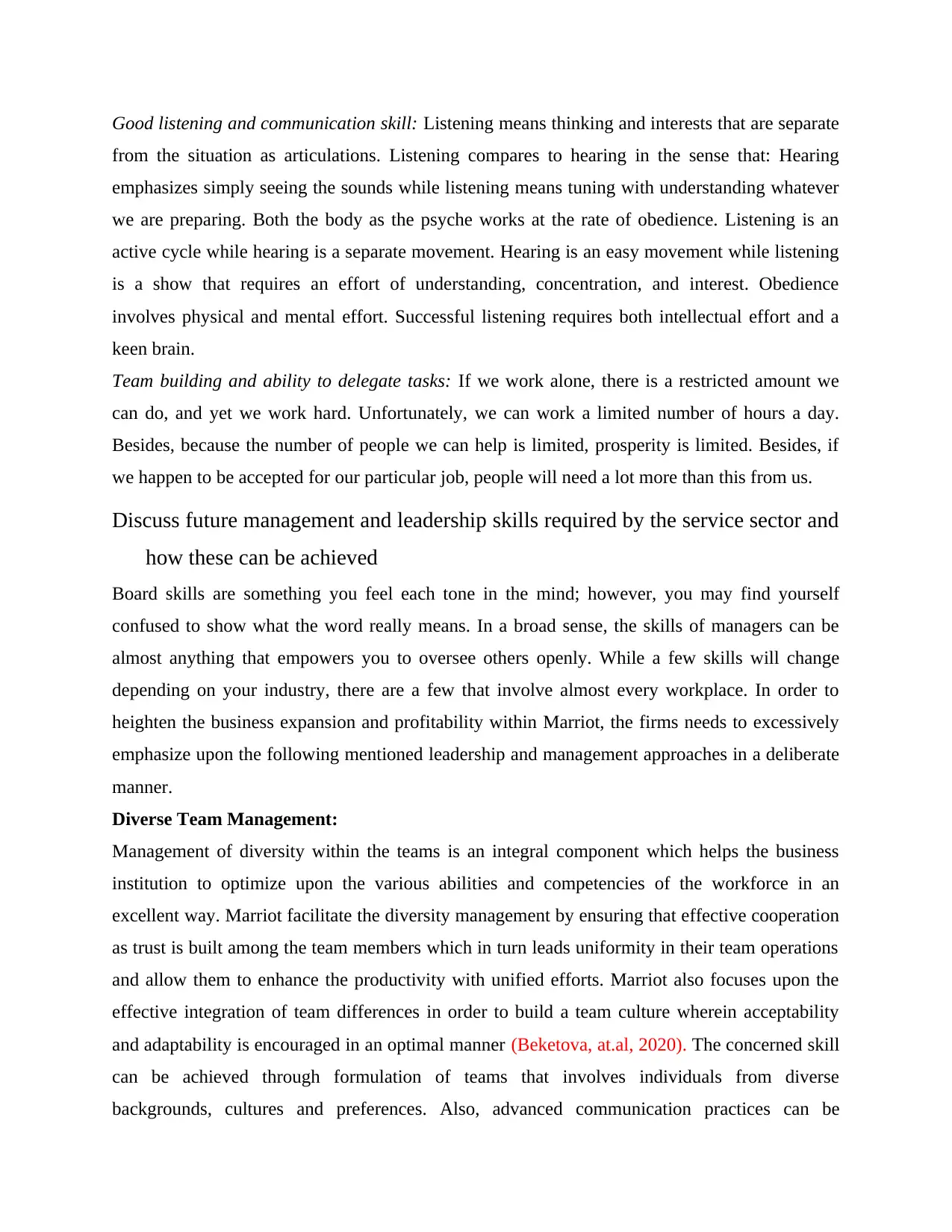
Good listening and communication skill: Listening means thinking and interests that are separate
from the situation as articulations. Listening compares to hearing in the sense that: Hearing
emphasizes simply seeing the sounds while listening means tuning with understanding whatever
we are preparing. Both the body as the psyche works at the rate of obedience. Listening is an
active cycle while hearing is a separate movement. Hearing is an easy movement while listening
is a show that requires an effort of understanding, concentration, and interest. Obedience
involves physical and mental effort. Successful listening requires both intellectual effort and a
keen brain.
Team building and ability to delegate tasks: If we work alone, there is a restricted amount we
can do, and yet we work hard. Unfortunately, we can work a limited number of hours a day.
Besides, because the number of people we can help is limited, prosperity is limited. Besides, if
we happen to be accepted for our particular job, people will need a lot more than this from us.
Discuss future management and leadership skills required by the service sector and
how these can be achieved
Board skills are something you feel each tone in the mind; however, you may find yourself
confused to show what the word really means. In a broad sense, the skills of managers can be
almost anything that empowers you to oversee others openly. While a few skills will change
depending on your industry, there are a few that involve almost every workplace. In order to
heighten the business expansion and profitability within Marriot, the firms needs to excessively
emphasize upon the following mentioned leadership and management approaches in a deliberate
manner.
Diverse Team Management:
Management of diversity within the teams is an integral component which helps the business
institution to optimize upon the various abilities and competencies of the workforce in an
excellent way. Marriot facilitate the diversity management by ensuring that effective cooperation
as trust is built among the team members which in turn leads uniformity in their team operations
and allow them to enhance the productivity with unified efforts. Marriot also focuses upon the
effective integration of team differences in order to build a team culture wherein acceptability
and adaptability is encouraged in an optimal manner (Beketova, at.al, 2020). The concerned skill
can be achieved through formulation of teams that involves individuals from diverse
backgrounds, cultures and preferences. Also, advanced communication practices can be
from the situation as articulations. Listening compares to hearing in the sense that: Hearing
emphasizes simply seeing the sounds while listening means tuning with understanding whatever
we are preparing. Both the body as the psyche works at the rate of obedience. Listening is an
active cycle while hearing is a separate movement. Hearing is an easy movement while listening
is a show that requires an effort of understanding, concentration, and interest. Obedience
involves physical and mental effort. Successful listening requires both intellectual effort and a
keen brain.
Team building and ability to delegate tasks: If we work alone, there is a restricted amount we
can do, and yet we work hard. Unfortunately, we can work a limited number of hours a day.
Besides, because the number of people we can help is limited, prosperity is limited. Besides, if
we happen to be accepted for our particular job, people will need a lot more than this from us.
Discuss future management and leadership skills required by the service sector and
how these can be achieved
Board skills are something you feel each tone in the mind; however, you may find yourself
confused to show what the word really means. In a broad sense, the skills of managers can be
almost anything that empowers you to oversee others openly. While a few skills will change
depending on your industry, there are a few that involve almost every workplace. In order to
heighten the business expansion and profitability within Marriot, the firms needs to excessively
emphasize upon the following mentioned leadership and management approaches in a deliberate
manner.
Diverse Team Management:
Management of diversity within the teams is an integral component which helps the business
institution to optimize upon the various abilities and competencies of the workforce in an
excellent way. Marriot facilitate the diversity management by ensuring that effective cooperation
as trust is built among the team members which in turn leads uniformity in their team operations
and allow them to enhance the productivity with unified efforts. Marriot also focuses upon the
effective integration of team differences in order to build a team culture wherein acceptability
and adaptability is encouraged in an optimal manner (Beketova, at.al, 2020). The concerned skill
can be achieved through formulation of teams that involves individuals from diverse
backgrounds, cultures and preferences. Also, advanced communication practices can be
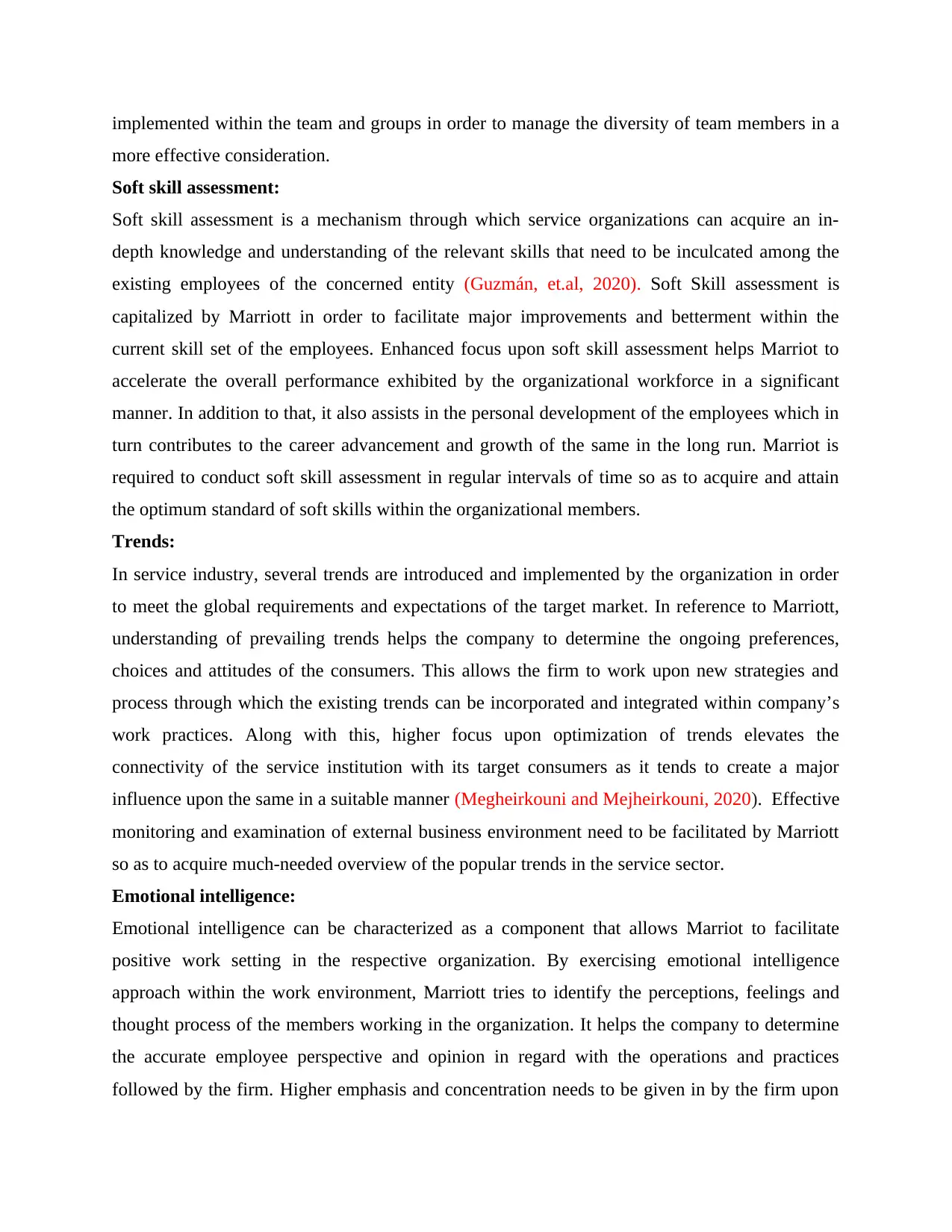
implemented within the team and groups in order to manage the diversity of team members in a
more effective consideration.
Soft skill assessment:
Soft skill assessment is a mechanism through which service organizations can acquire an in-
depth knowledge and understanding of the relevant skills that need to be inculcated among the
existing employees of the concerned entity (Guzmán, et.al, 2020). Soft Skill assessment is
capitalized by Marriott in order to facilitate major improvements and betterment within the
current skill set of the employees. Enhanced focus upon soft skill assessment helps Marriot to
accelerate the overall performance exhibited by the organizational workforce in a significant
manner. In addition to that, it also assists in the personal development of the employees which in
turn contributes to the career advancement and growth of the same in the long run. Marriot is
required to conduct soft skill assessment in regular intervals of time so as to acquire and attain
the optimum standard of soft skills within the organizational members.
Trends:
In service industry, several trends are introduced and implemented by the organization in order
to meet the global requirements and expectations of the target market. In reference to Marriott,
understanding of prevailing trends helps the company to determine the ongoing preferences,
choices and attitudes of the consumers. This allows the firm to work upon new strategies and
process through which the existing trends can be incorporated and integrated within company’s
work practices. Along with this, higher focus upon optimization of trends elevates the
connectivity of the service institution with its target consumers as it tends to create a major
influence upon the same in a suitable manner (Megheirkouni and Mejheirkouni, 2020). Effective
monitoring and examination of external business environment need to be facilitated by Marriott
so as to acquire much-needed overview of the popular trends in the service sector.
Emotional intelligence:
Emotional intelligence can be characterized as a component that allows Marriot to facilitate
positive work setting in the respective organization. By exercising emotional intelligence
approach within the work environment, Marriott tries to identify the perceptions, feelings and
thought process of the members working in the organization. It helps the company to determine
the accurate employee perspective and opinion in regard with the operations and practices
followed by the firm. Higher emphasis and concentration needs to be given in by the firm upon
more effective consideration.
Soft skill assessment:
Soft skill assessment is a mechanism through which service organizations can acquire an in-
depth knowledge and understanding of the relevant skills that need to be inculcated among the
existing employees of the concerned entity (Guzmán, et.al, 2020). Soft Skill assessment is
capitalized by Marriott in order to facilitate major improvements and betterment within the
current skill set of the employees. Enhanced focus upon soft skill assessment helps Marriot to
accelerate the overall performance exhibited by the organizational workforce in a significant
manner. In addition to that, it also assists in the personal development of the employees which in
turn contributes to the career advancement and growth of the same in the long run. Marriot is
required to conduct soft skill assessment in regular intervals of time so as to acquire and attain
the optimum standard of soft skills within the organizational members.
Trends:
In service industry, several trends are introduced and implemented by the organization in order
to meet the global requirements and expectations of the target market. In reference to Marriott,
understanding of prevailing trends helps the company to determine the ongoing preferences,
choices and attitudes of the consumers. This allows the firm to work upon new strategies and
process through which the existing trends can be incorporated and integrated within company’s
work practices. Along with this, higher focus upon optimization of trends elevates the
connectivity of the service institution with its target consumers as it tends to create a major
influence upon the same in a suitable manner (Megheirkouni and Mejheirkouni, 2020). Effective
monitoring and examination of external business environment need to be facilitated by Marriott
so as to acquire much-needed overview of the popular trends in the service sector.
Emotional intelligence:
Emotional intelligence can be characterized as a component that allows Marriot to facilitate
positive work setting in the respective organization. By exercising emotional intelligence
approach within the work environment, Marriott tries to identify the perceptions, feelings and
thought process of the members working in the organization. It helps the company to determine
the accurate employee perspective and opinion in regard with the operations and practices
followed by the firm. Higher emphasis and concentration needs to be given in by the firm upon
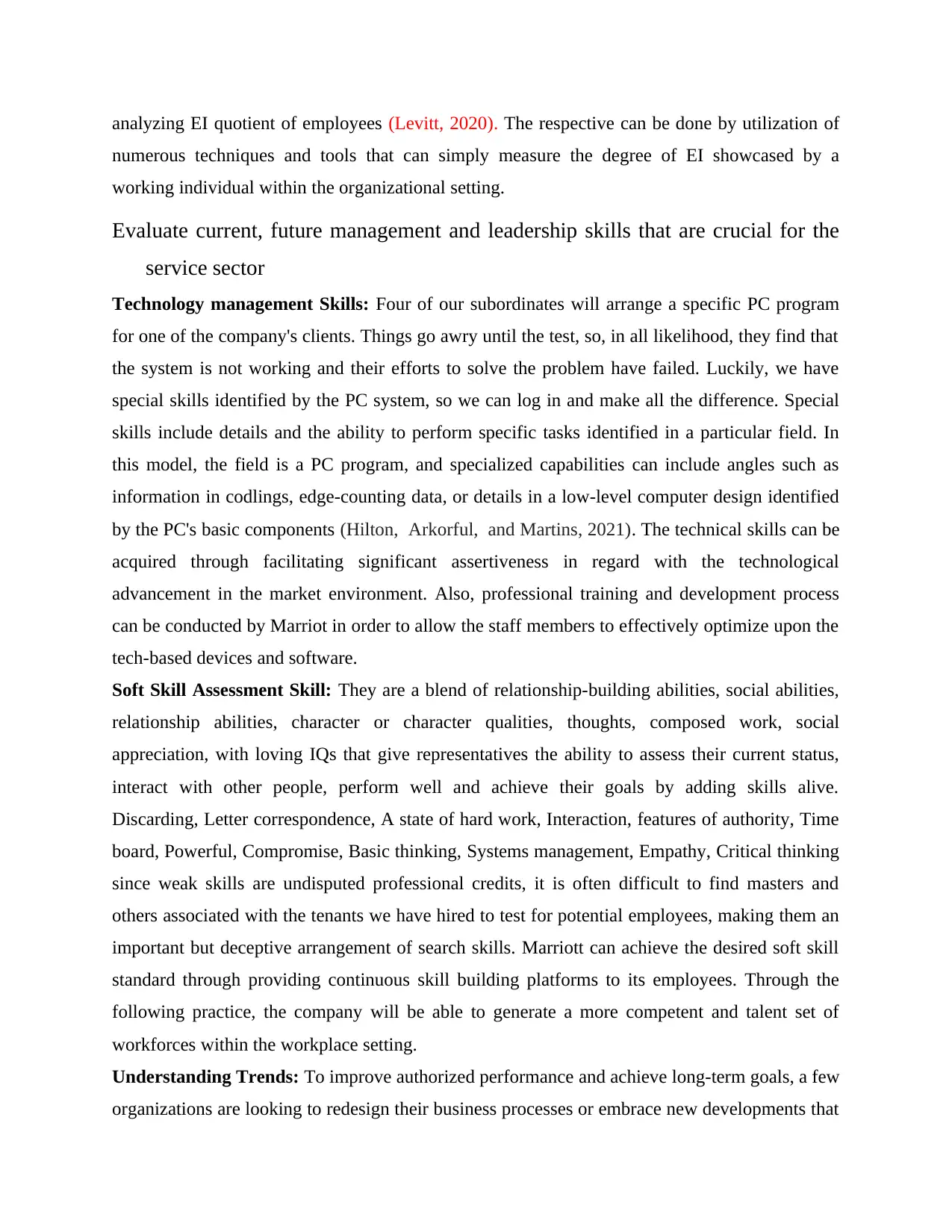
analyzing EI quotient of employees (Levitt, 2020). The respective can be done by utilization of
numerous techniques and tools that can simply measure the degree of EI showcased by a
working individual within the organizational setting.
Evaluate current, future management and leadership skills that are crucial for the
service sector
Technology management Skills: Four of our subordinates will arrange a specific PC program
for one of the company's clients. Things go awry until the test, so, in all likelihood, they find that
the system is not working and their efforts to solve the problem have failed. Luckily, we have
special skills identified by the PC system, so we can log in and make all the difference. Special
skills include details and the ability to perform specific tasks identified in a particular field. In
this model, the field is a PC program, and specialized capabilities can include angles such as
information in codlings, edge-counting data, or details in a low-level computer design identified
by the PC's basic components (Hilton, Arkorful, and Martins, 2021). The technical skills can be
acquired through facilitating significant assertiveness in regard with the technological
advancement in the market environment. Also, professional training and development process
can be conducted by Marriot in order to allow the staff members to effectively optimize upon the
tech-based devices and software.
Soft Skill Assessment Skill: They are a blend of relationship-building abilities, social abilities,
relationship abilities, character or character qualities, thoughts, composed work, social
appreciation, with loving IQs that give representatives the ability to assess their current status,
interact with other people, perform well and achieve their goals by adding skills alive.
Discarding, Letter correspondence, A state of hard work, Interaction, features of authority, Time
board, Powerful, Compromise, Basic thinking, Systems management, Empathy, Critical thinking
since weak skills are undisputed professional credits, it is often difficult to find masters and
others associated with the tenants we have hired to test for potential employees, making them an
important but deceptive arrangement of search skills. Marriott can achieve the desired soft skill
standard through providing continuous skill building platforms to its employees. Through the
following practice, the company will be able to generate a more competent and talent set of
workforces within the workplace setting.
Understanding Trends: To improve authorized performance and achieve long-term goals, a few
organizations are looking to redesign their business processes or embrace new developments that
numerous techniques and tools that can simply measure the degree of EI showcased by a
working individual within the organizational setting.
Evaluate current, future management and leadership skills that are crucial for the
service sector
Technology management Skills: Four of our subordinates will arrange a specific PC program
for one of the company's clients. Things go awry until the test, so, in all likelihood, they find that
the system is not working and their efforts to solve the problem have failed. Luckily, we have
special skills identified by the PC system, so we can log in and make all the difference. Special
skills include details and the ability to perform specific tasks identified in a particular field. In
this model, the field is a PC program, and specialized capabilities can include angles such as
information in codlings, edge-counting data, or details in a low-level computer design identified
by the PC's basic components (Hilton, Arkorful, and Martins, 2021). The technical skills can be
acquired through facilitating significant assertiveness in regard with the technological
advancement in the market environment. Also, professional training and development process
can be conducted by Marriot in order to allow the staff members to effectively optimize upon the
tech-based devices and software.
Soft Skill Assessment Skill: They are a blend of relationship-building abilities, social abilities,
relationship abilities, character or character qualities, thoughts, composed work, social
appreciation, with loving IQs that give representatives the ability to assess their current status,
interact with other people, perform well and achieve their goals by adding skills alive.
Discarding, Letter correspondence, A state of hard work, Interaction, features of authority, Time
board, Powerful, Compromise, Basic thinking, Systems management, Empathy, Critical thinking
since weak skills are undisputed professional credits, it is often difficult to find masters and
others associated with the tenants we have hired to test for potential employees, making them an
important but deceptive arrangement of search skills. Marriott can achieve the desired soft skill
standard through providing continuous skill building platforms to its employees. Through the
following practice, the company will be able to generate a more competent and talent set of
workforces within the workplace setting.
Understanding Trends: To improve authorized performance and achieve long-term goals, a few
organizations are looking to redesign their business processes or embrace new developments that
Secure Best Marks with AI Grader
Need help grading? Try our AI Grader for instant feedback on your assignments.
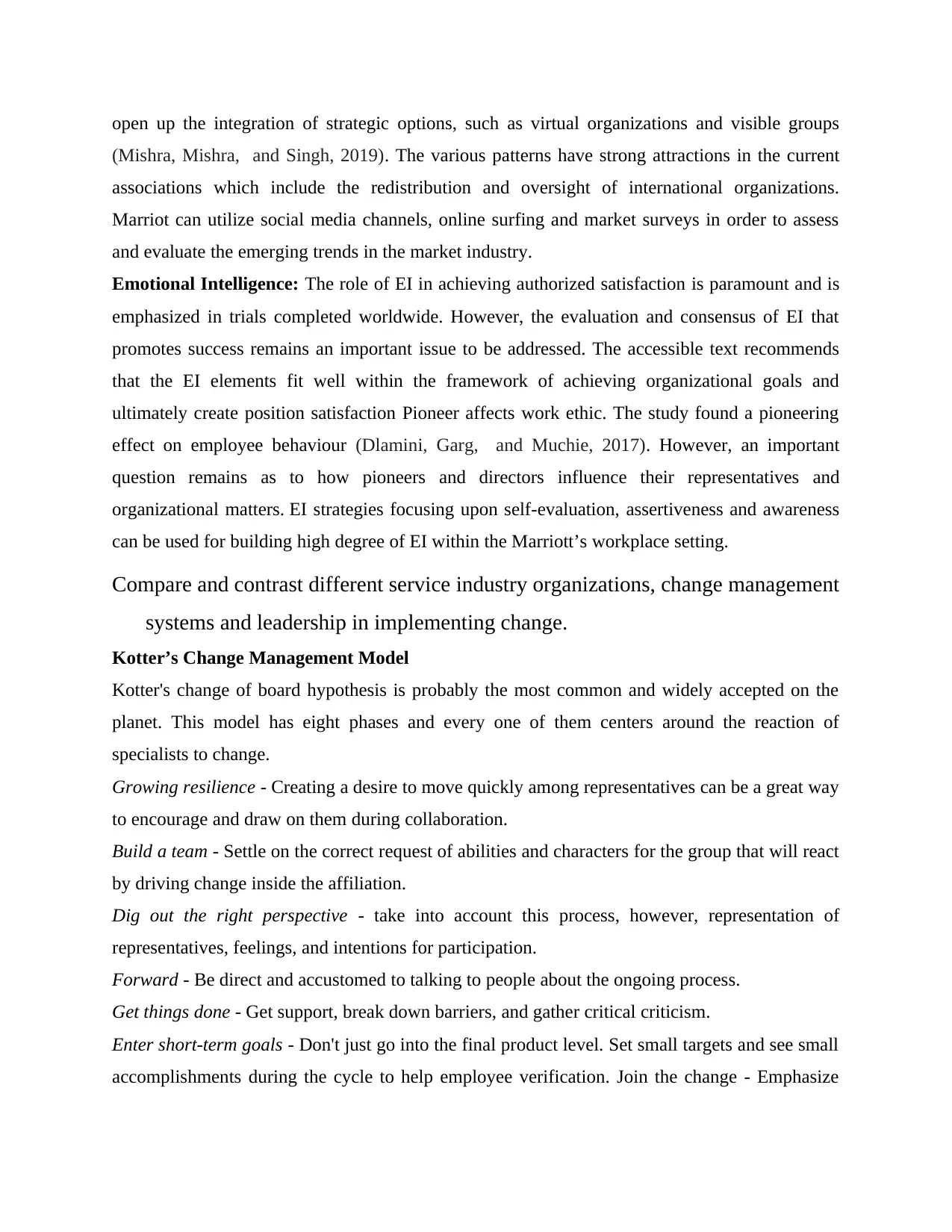
open up the integration of strategic options, such as virtual organizations and visible groups
(Mishra, Mishra, and Singh, 2019). The various patterns have strong attractions in the current
associations which include the redistribution and oversight of international organizations.
Marriot can utilize social media channels, online surfing and market surveys in order to assess
and evaluate the emerging trends in the market industry.
Emotional Intelligence: The role of EI in achieving authorized satisfaction is paramount and is
emphasized in trials completed worldwide. However, the evaluation and consensus of EI that
promotes success remains an important issue to be addressed. The accessible text recommends
that the EI elements fit well within the framework of achieving organizational goals and
ultimately create position satisfaction Pioneer affects work ethic. The study found a pioneering
effect on employee behaviour (Dlamini, Garg, and Muchie, 2017). However, an important
question remains as to how pioneers and directors influence their representatives and
organizational matters. EI strategies focusing upon self-evaluation, assertiveness and awareness
can be used for building high degree of EI within the Marriott’s workplace setting.
Compare and contrast different service industry organizations, change management
systems and leadership in implementing change.
Kotter’s Change Management Model
Kotter's change of board hypothesis is probably the most common and widely accepted on the
planet. This model has eight phases and every one of them centers around the reaction of
specialists to change.
Growing resilience - Creating a desire to move quickly among representatives can be a great way
to encourage and draw on them during collaboration.
Build a team - Settle on the correct request of abilities and characters for the group that will react
by driving change inside the affiliation.
Dig out the right perspective - take into account this process, however, representation of
representatives, feelings, and intentions for participation.
Forward - Be direct and accustomed to talking to people about the ongoing process.
Get things done - Get support, break down barriers, and gather critical criticism.
Enter short-term goals - Don't just go into the final product level. Set small targets and see small
accomplishments during the cycle to help employee verification. Join the change - Emphasize
(Mishra, Mishra, and Singh, 2019). The various patterns have strong attractions in the current
associations which include the redistribution and oversight of international organizations.
Marriot can utilize social media channels, online surfing and market surveys in order to assess
and evaluate the emerging trends in the market industry.
Emotional Intelligence: The role of EI in achieving authorized satisfaction is paramount and is
emphasized in trials completed worldwide. However, the evaluation and consensus of EI that
promotes success remains an important issue to be addressed. The accessible text recommends
that the EI elements fit well within the framework of achieving organizational goals and
ultimately create position satisfaction Pioneer affects work ethic. The study found a pioneering
effect on employee behaviour (Dlamini, Garg, and Muchie, 2017). However, an important
question remains as to how pioneers and directors influence their representatives and
organizational matters. EI strategies focusing upon self-evaluation, assertiveness and awareness
can be used for building high degree of EI within the Marriott’s workplace setting.
Compare and contrast different service industry organizations, change management
systems and leadership in implementing change.
Kotter’s Change Management Model
Kotter's change of board hypothesis is probably the most common and widely accepted on the
planet. This model has eight phases and every one of them centers around the reaction of
specialists to change.
Growing resilience - Creating a desire to move quickly among representatives can be a great way
to encourage and draw on them during collaboration.
Build a team - Settle on the correct request of abilities and characters for the group that will react
by driving change inside the affiliation.
Dig out the right perspective - take into account this process, however, representation of
representatives, feelings, and intentions for participation.
Forward - Be direct and accustomed to talking to people about the ongoing process.
Get things done - Get support, break down barriers, and gather critical criticism.
Enter short-term goals - Don't just go into the final product level. Set small targets and see small
accomplishments during the cycle to help employee verification. Join the change - Emphasize
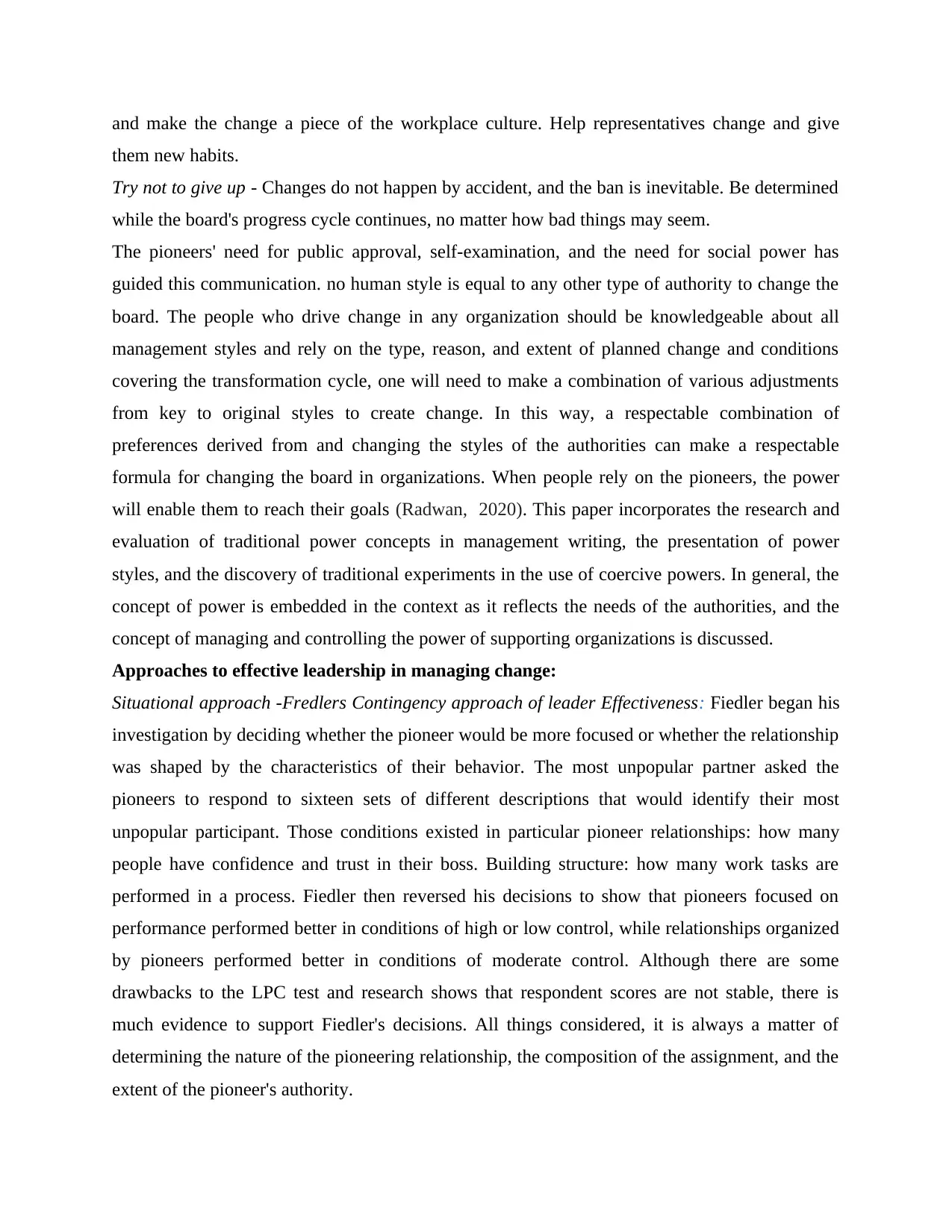
and make the change a piece of the workplace culture. Help representatives change and give
them new habits.
Try not to give up - Changes do not happen by accident, and the ban is inevitable. Be determined
while the board's progress cycle continues, no matter how bad things may seem.
The pioneers' need for public approval, self-examination, and the need for social power has
guided this communication. no human style is equal to any other type of authority to change the
board. The people who drive change in any organization should be knowledgeable about all
management styles and rely on the type, reason, and extent of planned change and conditions
covering the transformation cycle, one will need to make a combination of various adjustments
from key to original styles to create change. In this way, a respectable combination of
preferences derived from and changing the styles of the authorities can make a respectable
formula for changing the board in organizations. When people rely on the pioneers, the power
will enable them to reach their goals (Radwan, 2020). This paper incorporates the research and
evaluation of traditional power concepts in management writing, the presentation of power
styles, and the discovery of traditional experiments in the use of coercive powers. In general, the
concept of power is embedded in the context as it reflects the needs of the authorities, and the
concept of managing and controlling the power of supporting organizations is discussed.
Approaches to effective leadership in managing change:
Situational approach -Fredlers Contingency approach of leader Effectiveness: Fiedler began his
investigation by deciding whether the pioneer would be more focused or whether the relationship
was shaped by the characteristics of their behavior. The most unpopular partner asked the
pioneers to respond to sixteen sets of different descriptions that would identify their most
unpopular participant. Those conditions existed in particular pioneer relationships: how many
people have confidence and trust in their boss. Building structure: how many work tasks are
performed in a process. Fiedler then reversed his decisions to show that pioneers focused on
performance performed better in conditions of high or low control, while relationships organized
by pioneers performed better in conditions of moderate control. Although there are some
drawbacks to the LPC test and research shows that respondent scores are not stable, there is
much evidence to support Fiedler's decisions. All things considered, it is always a matter of
determining the nature of the pioneering relationship, the composition of the assignment, and the
extent of the pioneer's authority.
them new habits.
Try not to give up - Changes do not happen by accident, and the ban is inevitable. Be determined
while the board's progress cycle continues, no matter how bad things may seem.
The pioneers' need for public approval, self-examination, and the need for social power has
guided this communication. no human style is equal to any other type of authority to change the
board. The people who drive change in any organization should be knowledgeable about all
management styles and rely on the type, reason, and extent of planned change and conditions
covering the transformation cycle, one will need to make a combination of various adjustments
from key to original styles to create change. In this way, a respectable combination of
preferences derived from and changing the styles of the authorities can make a respectable
formula for changing the board in organizations. When people rely on the pioneers, the power
will enable them to reach their goals (Radwan, 2020). This paper incorporates the research and
evaluation of traditional power concepts in management writing, the presentation of power
styles, and the discovery of traditional experiments in the use of coercive powers. In general, the
concept of power is embedded in the context as it reflects the needs of the authorities, and the
concept of managing and controlling the power of supporting organizations is discussed.
Approaches to effective leadership in managing change:
Situational approach -Fredlers Contingency approach of leader Effectiveness: Fiedler began his
investigation by deciding whether the pioneer would be more focused or whether the relationship
was shaped by the characteristics of their behavior. The most unpopular partner asked the
pioneers to respond to sixteen sets of different descriptions that would identify their most
unpopular participant. Those conditions existed in particular pioneer relationships: how many
people have confidence and trust in their boss. Building structure: how many work tasks are
performed in a process. Fiedler then reversed his decisions to show that pioneers focused on
performance performed better in conditions of high or low control, while relationships organized
by pioneers performed better in conditions of moderate control. Although there are some
drawbacks to the LPC test and research shows that respondent scores are not stable, there is
much evidence to support Fiedler's decisions. All things considered, it is always a matter of
determining the nature of the pioneering relationship, the composition of the assignment, and the
extent of the pioneer's authority.
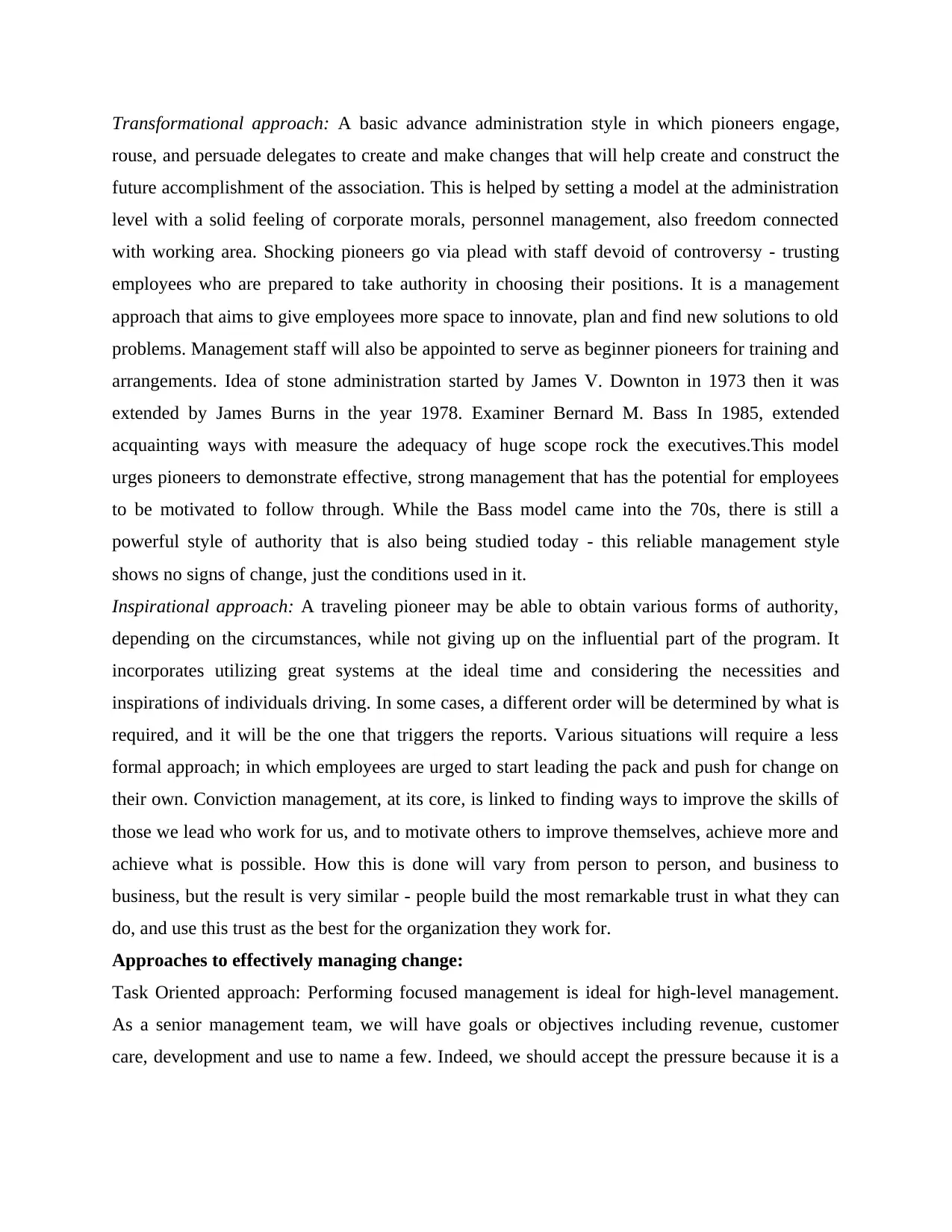
Transformational approach: A basic advance administration style in which pioneers engage,
rouse, and persuade delegates to create and make changes that will help create and construct the
future accomplishment of the association. This is helped by setting a model at the administration
level with a solid feeling of corporate morals, personnel management, also freedom connected
with working area. Shocking pioneers go via plead with staff devoid of controversy - trusting
employees who are prepared to take authority in choosing their positions. It is a management
approach that aims to give employees more space to innovate, plan and find new solutions to old
problems. Management staff will also be appointed to serve as beginner pioneers for training and
arrangements. Idea of stone administration started by James V. Downton in 1973 then it was
extended by James Burns in the year 1978. Examiner Bernard M. Bass In 1985, extended
acquainting ways with measure the adequacy of huge scope rock the executives.This model
urges pioneers to demonstrate effective, strong management that has the potential for employees
to be motivated to follow through. While the Bass model came into the 70s, there is still a
powerful style of authority that is also being studied today - this reliable management style
shows no signs of change, just the conditions used in it.
Inspirational approach: A traveling pioneer may be able to obtain various forms of authority,
depending on the circumstances, while not giving up on the influential part of the program. It
incorporates utilizing great systems at the ideal time and considering the necessities and
inspirations of individuals driving. In some cases, a different order will be determined by what is
required, and it will be the one that triggers the reports. Various situations will require a less
formal approach; in which employees are urged to start leading the pack and push for change on
their own. Conviction management, at its core, is linked to finding ways to improve the skills of
those we lead who work for us, and to motivate others to improve themselves, achieve more and
achieve what is possible. How this is done will vary from person to person, and business to
business, but the result is very similar - people build the most remarkable trust in what they can
do, and use this trust as the best for the organization they work for.
Approaches to effectively managing change:
Task Oriented approach: Performing focused management is ideal for high-level management.
As a senior management team, we will have goals or objectives including revenue, customer
care, development and use to name a few. Indeed, we should accept the pressure because it is a
rouse, and persuade delegates to create and make changes that will help create and construct the
future accomplishment of the association. This is helped by setting a model at the administration
level with a solid feeling of corporate morals, personnel management, also freedom connected
with working area. Shocking pioneers go via plead with staff devoid of controversy - trusting
employees who are prepared to take authority in choosing their positions. It is a management
approach that aims to give employees more space to innovate, plan and find new solutions to old
problems. Management staff will also be appointed to serve as beginner pioneers for training and
arrangements. Idea of stone administration started by James V. Downton in 1973 then it was
extended by James Burns in the year 1978. Examiner Bernard M. Bass In 1985, extended
acquainting ways with measure the adequacy of huge scope rock the executives.This model
urges pioneers to demonstrate effective, strong management that has the potential for employees
to be motivated to follow through. While the Bass model came into the 70s, there is still a
powerful style of authority that is also being studied today - this reliable management style
shows no signs of change, just the conditions used in it.
Inspirational approach: A traveling pioneer may be able to obtain various forms of authority,
depending on the circumstances, while not giving up on the influential part of the program. It
incorporates utilizing great systems at the ideal time and considering the necessities and
inspirations of individuals driving. In some cases, a different order will be determined by what is
required, and it will be the one that triggers the reports. Various situations will require a less
formal approach; in which employees are urged to start leading the pack and push for change on
their own. Conviction management, at its core, is linked to finding ways to improve the skills of
those we lead who work for us, and to motivate others to improve themselves, achieve more and
achieve what is possible. How this is done will vary from person to person, and business to
business, but the result is very similar - people build the most remarkable trust in what they can
do, and use this trust as the best for the organization they work for.
Approaches to effectively managing change:
Task Oriented approach: Performing focused management is ideal for high-level management.
As a senior management team, we will have goals or objectives including revenue, customer
care, development and use to name a few. Indeed, we should accept the pressure because it is a
Paraphrase This Document
Need a fresh take? Get an instant paraphrase of this document with our AI Paraphraser
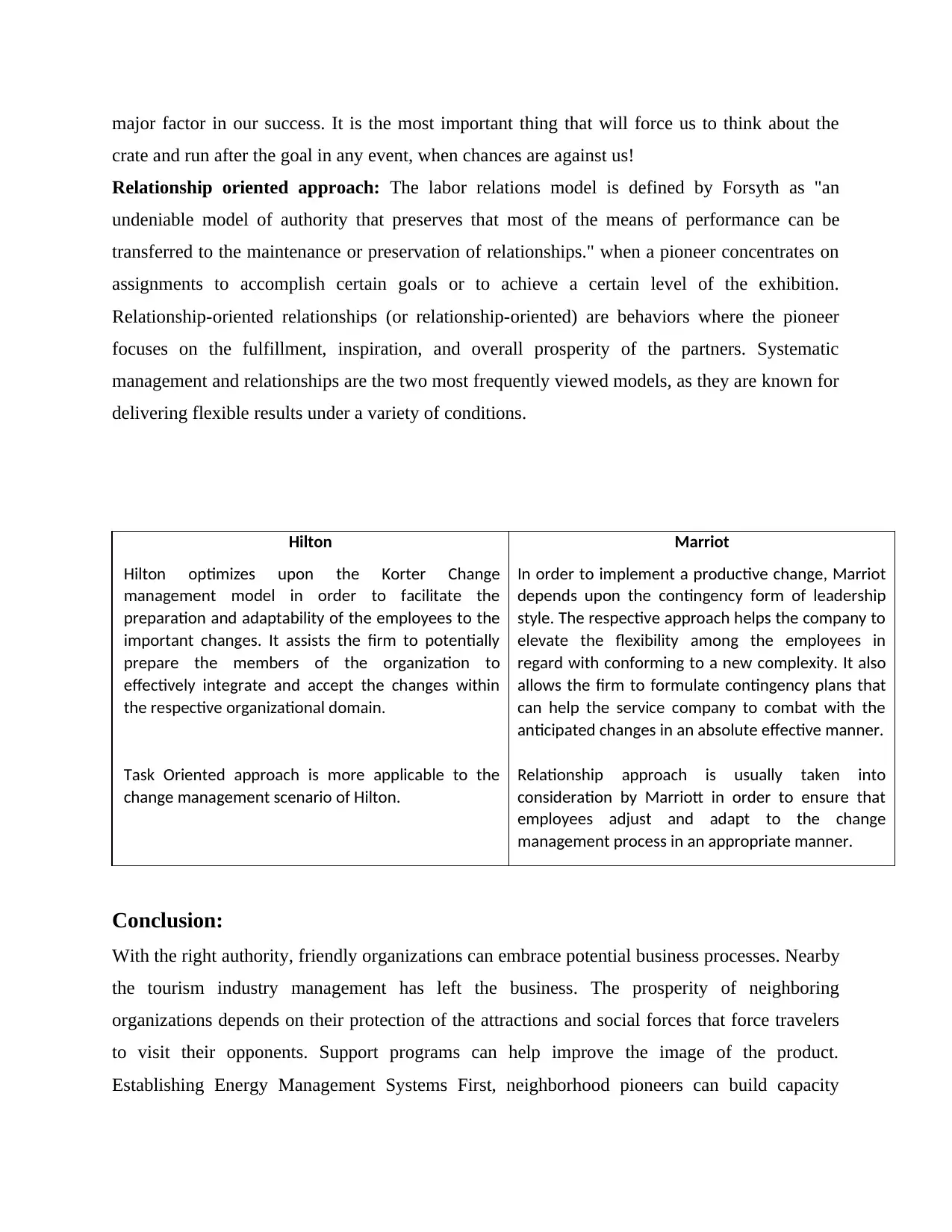
major factor in our success. It is the most important thing that will force us to think about the
crate and run after the goal in any event, when chances are against us!
Relationship oriented approach: The labor relations model is defined by Forsyth as "an
undeniable model of authority that preserves that most of the means of performance can be
transferred to the maintenance or preservation of relationships." when a pioneer concentrates on
assignments to accomplish certain goals or to achieve a certain level of the exhibition.
Relationship-oriented relationships (or relationship-oriented) are behaviors where the pioneer
focuses on the fulfillment, inspiration, and overall prosperity of the partners. Systematic
management and relationships are the two most frequently viewed models, as they are known for
delivering flexible results under a variety of conditions.
Hilton
Hilton optimizes upon the Korter Change
management model in order to facilitate the
preparation and adaptability of the employees to the
important changes. It assists the firm to potentially
prepare the members of the organization to
effectively integrate and accept the changes within
the respective organizational domain.
Task Oriented approach is more applicable to the
change management scenario of Hilton.
Marriot
In order to implement a productive change, Marriot
depends upon the contingency form of leadership
style. The respective approach helps the company to
elevate the flexibility among the employees in
regard with conforming to a new complexity. It also
allows the firm to formulate contingency plans that
can help the service company to combat with the
anticipated changes in an absolute effective manner.
Relationship approach is usually taken into
consideration by Marriott in order to ensure that
employees adjust and adapt to the change
management process in an appropriate manner.
Conclusion:
With the right authority, friendly organizations can embrace potential business processes. Nearby
the tourism industry management has left the business. The prosperity of neighboring
organizations depends on their protection of the attractions and social forces that force travelers
to visit their opponents. Support programs can help improve the image of the product.
Establishing Energy Management Systems First, neighborhood pioneers can build capacity
crate and run after the goal in any event, when chances are against us!
Relationship oriented approach: The labor relations model is defined by Forsyth as "an
undeniable model of authority that preserves that most of the means of performance can be
transferred to the maintenance or preservation of relationships." when a pioneer concentrates on
assignments to accomplish certain goals or to achieve a certain level of the exhibition.
Relationship-oriented relationships (or relationship-oriented) are behaviors where the pioneer
focuses on the fulfillment, inspiration, and overall prosperity of the partners. Systematic
management and relationships are the two most frequently viewed models, as they are known for
delivering flexible results under a variety of conditions.
Hilton
Hilton optimizes upon the Korter Change
management model in order to facilitate the
preparation and adaptability of the employees to the
important changes. It assists the firm to potentially
prepare the members of the organization to
effectively integrate and accept the changes within
the respective organizational domain.
Task Oriented approach is more applicable to the
change management scenario of Hilton.
Marriot
In order to implement a productive change, Marriot
depends upon the contingency form of leadership
style. The respective approach helps the company to
elevate the flexibility among the employees in
regard with conforming to a new complexity. It also
allows the firm to formulate contingency plans that
can help the service company to combat with the
anticipated changes in an absolute effective manner.
Relationship approach is usually taken into
consideration by Marriott in order to ensure that
employees adjust and adapt to the change
management process in an appropriate manner.
Conclusion:
With the right authority, friendly organizations can embrace potential business processes. Nearby
the tourism industry management has left the business. The prosperity of neighboring
organizations depends on their protection of the attractions and social forces that force travelers
to visit their opponents. Support programs can help improve the image of the product.
Establishing Energy Management Systems First, neighborhood pioneers can build capacity
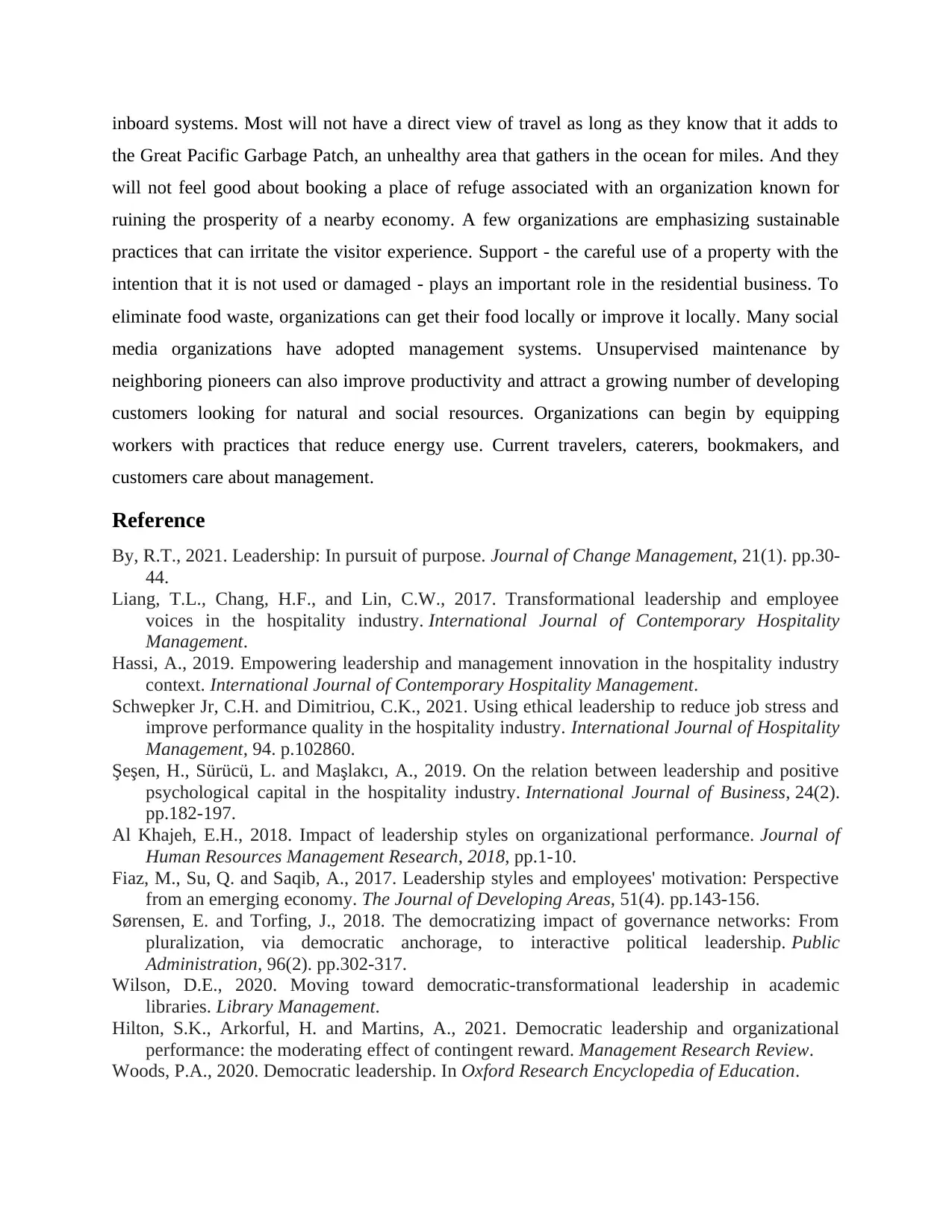
inboard systems. Most will not have a direct view of travel as long as they know that it adds to
the Great Pacific Garbage Patch, an unhealthy area that gathers in the ocean for miles. And they
will not feel good about booking a place of refuge associated with an organization known for
ruining the prosperity of a nearby economy. A few organizations are emphasizing sustainable
practices that can irritate the visitor experience. Support - the careful use of a property with the
intention that it is not used or damaged - plays an important role in the residential business. To
eliminate food waste, organizations can get their food locally or improve it locally. Many social
media organizations have adopted management systems. Unsupervised maintenance by
neighboring pioneers can also improve productivity and attract a growing number of developing
customers looking for natural and social resources. Organizations can begin by equipping
workers with practices that reduce energy use. Current travelers, caterers, bookmakers, and
customers care about management.
Reference
By, R.T., 2021. Leadership: In pursuit of purpose. Journal of Change Management, 21(1). pp.30-
44.
Liang, T.L., Chang, H.F., and Lin, C.W., 2017. Transformational leadership and employee
voices in the hospitality industry. International Journal of Contemporary Hospitality
Management.
Hassi, A., 2019. Empowering leadership and management innovation in the hospitality industry
context. International Journal of Contemporary Hospitality Management.
Schwepker Jr, C.H. and Dimitriou, C.K., 2021. Using ethical leadership to reduce job stress and
improve performance quality in the hospitality industry. International Journal of Hospitality
Management, 94. p.102860.
Şeşen, H., Sürücü, L. and Maşlakcı, A., 2019. On the relation between leadership and positive
psychological capital in the hospitality industry. International Journal of Business, 24(2).
pp.182-197.
Al Khajeh, E.H., 2018. Impact of leadership styles on organizational performance. Journal of
Human Resources Management Research, 2018, pp.1-10.
Fiaz, M., Su, Q. and Saqib, A., 2017. Leadership styles and employees' motivation: Perspective
from an emerging economy. The Journal of Developing Areas, 51(4). pp.143-156.
Sørensen, E. and Torfing, J., 2018. The democratizing impact of governance networks: From
pluralization, via democratic anchorage, to interactive political leadership. Public
Administration, 96(2). pp.302-317.
Wilson, D.E., 2020. Moving toward democratic-transformational leadership in academic
libraries. Library Management.
Hilton, S.K., Arkorful, H. and Martins, A., 2021. Democratic leadership and organizational
performance: the moderating effect of contingent reward. Management Research Review.
Woods, P.A., 2020. Democratic leadership. In Oxford Research Encyclopedia of Education.
the Great Pacific Garbage Patch, an unhealthy area that gathers in the ocean for miles. And they
will not feel good about booking a place of refuge associated with an organization known for
ruining the prosperity of a nearby economy. A few organizations are emphasizing sustainable
practices that can irritate the visitor experience. Support - the careful use of a property with the
intention that it is not used or damaged - plays an important role in the residential business. To
eliminate food waste, organizations can get their food locally or improve it locally. Many social
media organizations have adopted management systems. Unsupervised maintenance by
neighboring pioneers can also improve productivity and attract a growing number of developing
customers looking for natural and social resources. Organizations can begin by equipping
workers with practices that reduce energy use. Current travelers, caterers, bookmakers, and
customers care about management.
Reference
By, R.T., 2021. Leadership: In pursuit of purpose. Journal of Change Management, 21(1). pp.30-
44.
Liang, T.L., Chang, H.F., and Lin, C.W., 2017. Transformational leadership and employee
voices in the hospitality industry. International Journal of Contemporary Hospitality
Management.
Hassi, A., 2019. Empowering leadership and management innovation in the hospitality industry
context. International Journal of Contemporary Hospitality Management.
Schwepker Jr, C.H. and Dimitriou, C.K., 2021. Using ethical leadership to reduce job stress and
improve performance quality in the hospitality industry. International Journal of Hospitality
Management, 94. p.102860.
Şeşen, H., Sürücü, L. and Maşlakcı, A., 2019. On the relation between leadership and positive
psychological capital in the hospitality industry. International Journal of Business, 24(2).
pp.182-197.
Al Khajeh, E.H., 2018. Impact of leadership styles on organizational performance. Journal of
Human Resources Management Research, 2018, pp.1-10.
Fiaz, M., Su, Q. and Saqib, A., 2017. Leadership styles and employees' motivation: Perspective
from an emerging economy. The Journal of Developing Areas, 51(4). pp.143-156.
Sørensen, E. and Torfing, J., 2018. The democratizing impact of governance networks: From
pluralization, via democratic anchorage, to interactive political leadership. Public
Administration, 96(2). pp.302-317.
Wilson, D.E., 2020. Moving toward democratic-transformational leadership in academic
libraries. Library Management.
Hilton, S.K., Arkorful, H. and Martins, A., 2021. Democratic leadership and organizational
performance: the moderating effect of contingent reward. Management Research Review.
Woods, P.A., 2020. Democratic leadership. In Oxford Research Encyclopedia of Education.
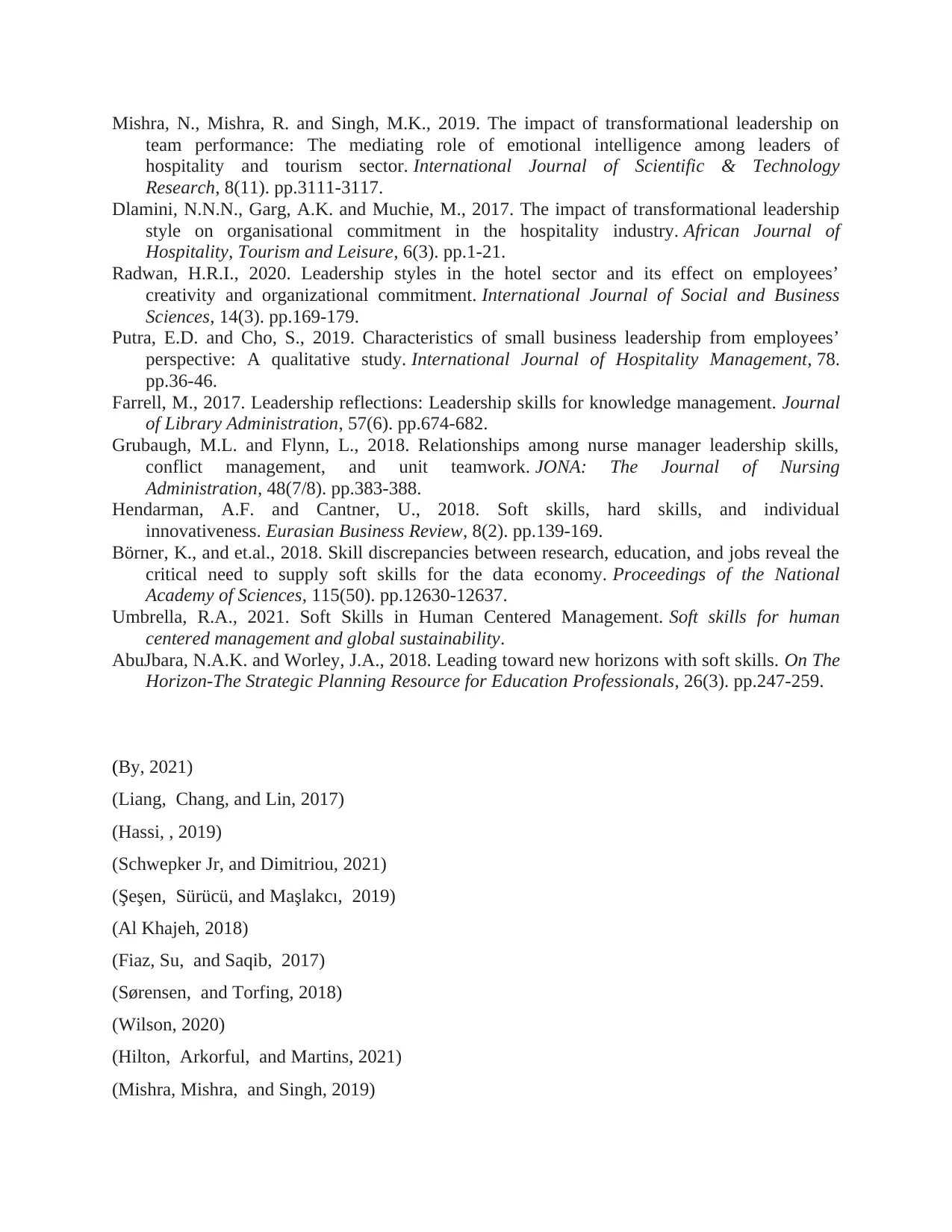
Mishra, N., Mishra, R. and Singh, M.K., 2019. The impact of transformational leadership on
team performance: The mediating role of emotional intelligence among leaders of
hospitality and tourism sector. International Journal of Scientific & Technology
Research, 8(11). pp.3111-3117.
Dlamini, N.N.N., Garg, A.K. and Muchie, M., 2017. The impact of transformational leadership
style on organisational commitment in the hospitality industry. African Journal of
Hospitality, Tourism and Leisure, 6(3). pp.1-21.
Radwan, H.R.I., 2020. Leadership styles in the hotel sector and its effect on employees’
creativity and organizational commitment. International Journal of Social and Business
Sciences, 14(3). pp.169-179.
Putra, E.D. and Cho, S., 2019. Characteristics of small business leadership from employees’
perspective: A qualitative study. International Journal of Hospitality Management, 78.
pp.36-46.
Farrell, M., 2017. Leadership reflections: Leadership skills for knowledge management. Journal
of Library Administration, 57(6). pp.674-682.
Grubaugh, M.L. and Flynn, L., 2018. Relationships among nurse manager leadership skills,
conflict management, and unit teamwork. JONA: The Journal of Nursing
Administration, 48(7/8). pp.383-388.
Hendarman, A.F. and Cantner, U., 2018. Soft skills, hard skills, and individual
innovativeness. Eurasian Business Review, 8(2). pp.139-169.
Börner, K., and et.al., 2018. Skill discrepancies between research, education, and jobs reveal the
critical need to supply soft skills for the data economy. Proceedings of the National
Academy of Sciences, 115(50). pp.12630-12637.
Umbrella, R.A., 2021. Soft Skills in Human Centered Management. Soft skills for human
centered management and global sustainability.
AbuJbara, N.A.K. and Worley, J.A., 2018. Leading toward new horizons with soft skills. On The
Horizon-The Strategic Planning Resource for Education Professionals, 26(3). pp.247-259.
(By, 2021)
(Liang, Chang, and Lin, 2017)
(Hassi, , 2019)
(Schwepker Jr, and Dimitriou, 2021)
(Şeşen, Sürücü, and Maşlakcı, 2019)
(Al Khajeh, 2018)
(Fiaz, Su, and Saqib, 2017)
(Sørensen, and Torfing, 2018)
(Wilson, 2020)
(Hilton, Arkorful, and Martins, 2021)
(Mishra, Mishra, and Singh, 2019)
team performance: The mediating role of emotional intelligence among leaders of
hospitality and tourism sector. International Journal of Scientific & Technology
Research, 8(11). pp.3111-3117.
Dlamini, N.N.N., Garg, A.K. and Muchie, M., 2017. The impact of transformational leadership
style on organisational commitment in the hospitality industry. African Journal of
Hospitality, Tourism and Leisure, 6(3). pp.1-21.
Radwan, H.R.I., 2020. Leadership styles in the hotel sector and its effect on employees’
creativity and organizational commitment. International Journal of Social and Business
Sciences, 14(3). pp.169-179.
Putra, E.D. and Cho, S., 2019. Characteristics of small business leadership from employees’
perspective: A qualitative study. International Journal of Hospitality Management, 78.
pp.36-46.
Farrell, M., 2017. Leadership reflections: Leadership skills for knowledge management. Journal
of Library Administration, 57(6). pp.674-682.
Grubaugh, M.L. and Flynn, L., 2018. Relationships among nurse manager leadership skills,
conflict management, and unit teamwork. JONA: The Journal of Nursing
Administration, 48(7/8). pp.383-388.
Hendarman, A.F. and Cantner, U., 2018. Soft skills, hard skills, and individual
innovativeness. Eurasian Business Review, 8(2). pp.139-169.
Börner, K., and et.al., 2018. Skill discrepancies between research, education, and jobs reveal the
critical need to supply soft skills for the data economy. Proceedings of the National
Academy of Sciences, 115(50). pp.12630-12637.
Umbrella, R.A., 2021. Soft Skills in Human Centered Management. Soft skills for human
centered management and global sustainability.
AbuJbara, N.A.K. and Worley, J.A., 2018. Leading toward new horizons with soft skills. On The
Horizon-The Strategic Planning Resource for Education Professionals, 26(3). pp.247-259.
(By, 2021)
(Liang, Chang, and Lin, 2017)
(Hassi, , 2019)
(Schwepker Jr, and Dimitriou, 2021)
(Şeşen, Sürücü, and Maşlakcı, 2019)
(Al Khajeh, 2018)
(Fiaz, Su, and Saqib, 2017)
(Sørensen, and Torfing, 2018)
(Wilson, 2020)
(Hilton, Arkorful, and Martins, 2021)
(Mishra, Mishra, and Singh, 2019)
Secure Best Marks with AI Grader
Need help grading? Try our AI Grader for instant feedback on your assignments.
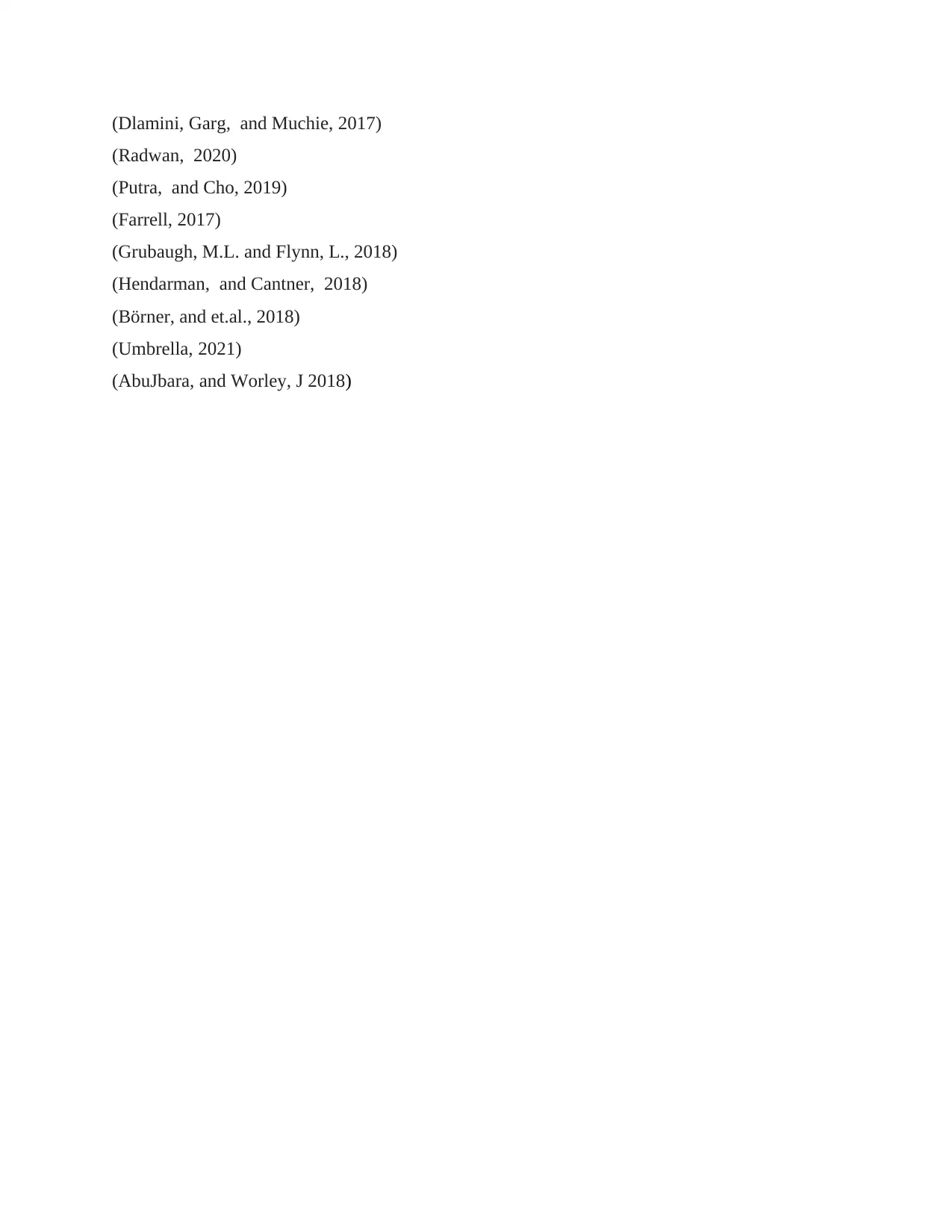
(Dlamini, Garg, and Muchie, 2017)
(Radwan, 2020)
(Putra, and Cho, 2019)
(Farrell, 2017)
(Grubaugh, M.L. and Flynn, L., 2018)
(Hendarman, and Cantner, 2018)
(Börner, and et.al., 2018)
(Umbrella, 2021)
(AbuJbara, and Worley, J 2018)
(Radwan, 2020)
(Putra, and Cho, 2019)
(Farrell, 2017)
(Grubaugh, M.L. and Flynn, L., 2018)
(Hendarman, and Cantner, 2018)
(Börner, and et.al., 2018)
(Umbrella, 2021)
(AbuJbara, and Worley, J 2018)
1 out of 26
![[object Object]](/_next/static/media/star-bottom.7253800d.svg)





